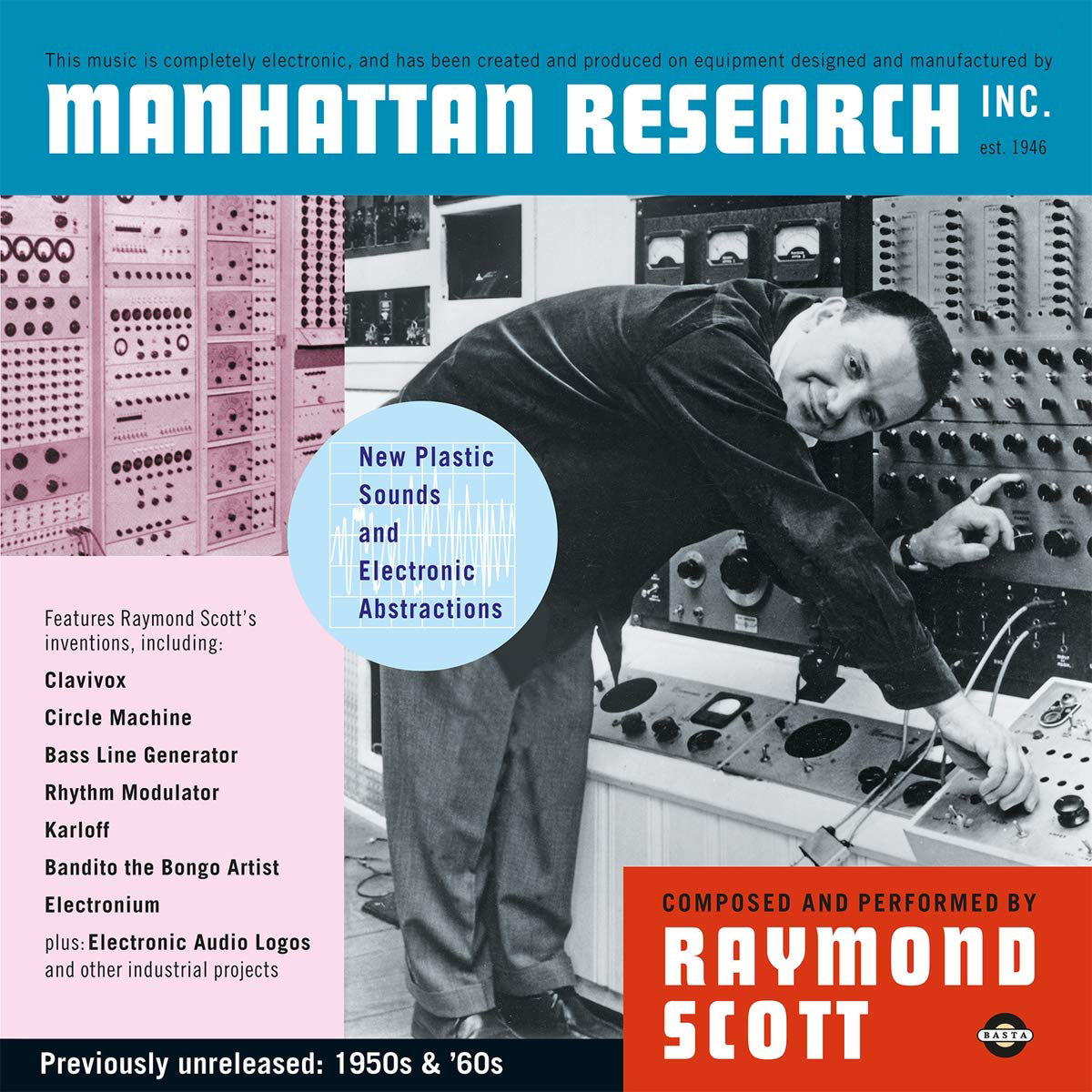
Raymond Scott – Manhattan Research Inc.
 Perhaps unfairly best known for having his music repurposed into the backing tracks for classic Warner Bros. cartoons, the late Raymond Scott has another claim to fame that often gets overlooked – he was one of the true pioneers of electronic music in America. In this area, Scott was a true renaissance man: not only did he pioneer the sound, but he built his own instruments and early devices that presaged sequencers, and he even did some of the first work on multi-track recording, at roughly the same time that Les Paul was experimenting with similar ideas. In the 1950s and 1960s (at roughly the same time as the ascendancy of the BBC Radiophonic Workshop), Scott was carving out his own path in an entire new genre of music.
Perhaps unfairly best known for having his music repurposed into the backing tracks for classic Warner Bros. cartoons, the late Raymond Scott has another claim to fame that often gets overlooked – he was one of the true pioneers of electronic music in America. In this area, Scott was a true renaissance man: not only did he pioneer the sound, but he built his own instruments and early devices that presaged sequencers, and he even did some of the first work on multi-track recording, at roughly the same time that Les Paul was experimenting with similar ideas. In the 1950s and 1960s (at roughly the same time as the ascendancy of the BBC Radiophonic Workshop), Scott was carving out his own path in an entire new genre of music.
Not only that, but Scott was trying his hardest to make his experiments pay for themselves: he marketed his unusual new sounds as music beds and jingles for commercials, with some success. The two-disc Manhattan Research, Inc. collection chronicles and archives that material, with a selection of Scott’s finished spots (both with and without announcers/singers) as well as demos and experiments that never made it to radio. The commercials range from obscurely local/regional campaigns (Baltimore Gas & Electric Company) to major national campaigns (IBM, Bufferin, Vicks, General Motors and a Sprite radio campaign that remains famous enough that it’s now become an ironic cover song). In a way, Scott achieved his aim by getting a new style of music into the ears of millions of listeners – but until now, not with any recognition.
While the commercials are a nostalgia trip that goes back even before the writer of this review was born, some of the purely instrumental pieces are startlingly ahead of their time: the “Night and Day” track on the first disc could’ve caught on in the 1980s had it been revived then. “Take Me To Your Violin Teacher” could easily be mistaken for modern chiptunes performed with 1980s video game hardware… and yet it was recorded in 1969. “Ripples (Montage)” anticipates abstract-but-tuneful electronic film scoring. “Cindy Electronium” sounds like late ’80s/early ’90s video game music.
There are a few throwbacks as well; Scott tries out completely electronic renditions of his existing compositions including “The Toy Trumpet” (which becomes almost unrecognizable) and “Twilight In Turkey”, both of which featured in their original, jazzier forms on Reckless Nights & Turkish Twilights. Some of his electronic music beds are also quite obviously very close cousins of the music from his Soothing Sounds For Baby albums. There’s also one very interesting guest star on a few tracks: the voice of none other than Jim Henson graces some tracks recorded in 1969, including “Limbo: The Organized Mind”, a free-form ramble set to Scott’s electronic sounds, and a couple of Bufferin commercials which seem to have sprung from “Limbo” both conceptually and musically.
A lot of this information, incidentally, is included in a book that clocks in at around 140 pages and covers Scott’s entire life and career, not just the material on these two CDs, in a wealth of detail.
 Raymond Scott is still overdue for a reassessment of one of the electronic music pioneers in the United States, to say nothing of being a composer whose works influenced generations of children (by way of Warner Bros. cartoons). Manhattan Research, Inc. really isn’t a “general audience” listening experience, but it’s an invaluable archive for anyone interested in how electronic music gained a foothold in our national consciousness: in little snippets, 30 or so seconds at a time, behind commercial announcers and jingle singers.
Raymond Scott is still overdue for a reassessment of one of the electronic music pioneers in the United States, to say nothing of being a composer whose works influenced generations of children (by way of Warner Bros. cartoons). Manhattan Research, Inc. really isn’t a “general audience” listening experience, but it’s an invaluable archive for anyone interested in how electronic music gained a foothold in our national consciousness: in little snippets, 30 or so seconds at a time, behind commercial announcers and jingle singers.
Disc One
- Manhattan Research, Inc. Copyright (0:11)
- Baltimore Gas & Electric Co. (Instrumental, Take 4) (1:14)
- Bendix 1: The Tomorrow People (1:06)
- Lightworks (1:52)
- The Bass-line Generator (3:10)
- Don’t Beat Your Wife Every Night! (1:44)
- B.C. 1675 (Gillette Conga Drum Jingle) (3:16)
- Vim (0:59)
- Auto-Lite: Sta-Ful (Instrumental) (0:47)
- Sprite: Melonball Bounce (Instrumental) (1963)
- Sprite: Melonball Bounce (1963)
- Wheels That Go (0:50)
- Limbo: The Organized Mind (4:33)
- Portofino 1 (2:13)
- County Fair (1:01)
- Lady Gaylord (1:02)
- Good Air (Take 7) (0:38)
- IBM MT/ST: The Paperwork Explosion (4:31)
- Domino (0:33)
- Super Cheer (0:34)
- Cheer: Revision 3 (New Backgrounds) (0:39)
- Twilight in Turkey (1:32)
- Raymond Scott Quote / Vicks: Medicated Cough Drops (1:34)
- Vicks: Formula 44 (0:46)
- Auto-Lite: Spark Plugs (1:00)
- Nescafe (1:06)
- Awake (0:35)
- Backwards Overload (6:04)
- Bufferin: Memories (Original) (0:59)
- Bandito the Bongo Artist (1:30)
- Night and Day (Cole Porter) (1:45)
- Baltimore Gas & Electric Co. (“395”) (1:07)
- K2r (0:19)
- IBM Probe (1:56)
- GMGM 1A (1:49)
- The Rhythm Modulator (3:37)
Disc Two
- Ohio Plus (0:17)
- In the Hall of the Mountain Queen (0:49)
- General Motors: Futurama (1:04)
- Portofino 2 (2:14)
- The Wild Piece (a.k.a. String Piece) (4:07)
- Take Me to Your Violin Teacher (1:40)
- Ripples (Original Soundtrack) (0:59)
- Cyclic Bit (1:04)
- Ripples (Montage) (4:06)
- The Wing Thing (1:00)
- County Fair (Instrumental) (1:00)
- Cindy Electronium (1:59)
- Don’t Beat Your Wife Every Night! (Instrumental) (1:45)
- Hostess: Twinkies (0:32)
- Hostess: Twinkies (Instrumental) (0:32)
- Ohio Bell: Thermo Fax (0:24)
- Pygmy Taxi Corporation (7:11)
- Baltimore Gas & Electric Co. (Announce Copy, Take 1) (0:29)
- Baltimore Gas & Electric Co. (0:44)
- Lightworks (Slow) (1:40)
- The Paperwork Explosion (Instrumental) (3:30)
- Auto-Lite: Ford Family (1:03)
- Auto-Lite: Ford Family (Instrumental) (0:54)
- Raymond Scott Quote / Auto-Lite: Wheels (1:50)
- Bufferin: Memories (Demo) (0:44)
- Space Mystery (Montage) (5:11)
- The Toy Trumpet (2:15)
- Backwards Beeps (1:05)
- Raymond Scott Quote / Auto-Lite: Sta-Ful (1:36)
- Lightworks (Instrumental) (1:29)
- When Will It End? (3:14)
- Bendix 2: The Tomorrow People (1963)
- Electronic Audio Logos, Inc. (5:23)
Released by: Basta
Release date: 2000
Disc one total running time: 58:48
Disc two total running time: 63:11
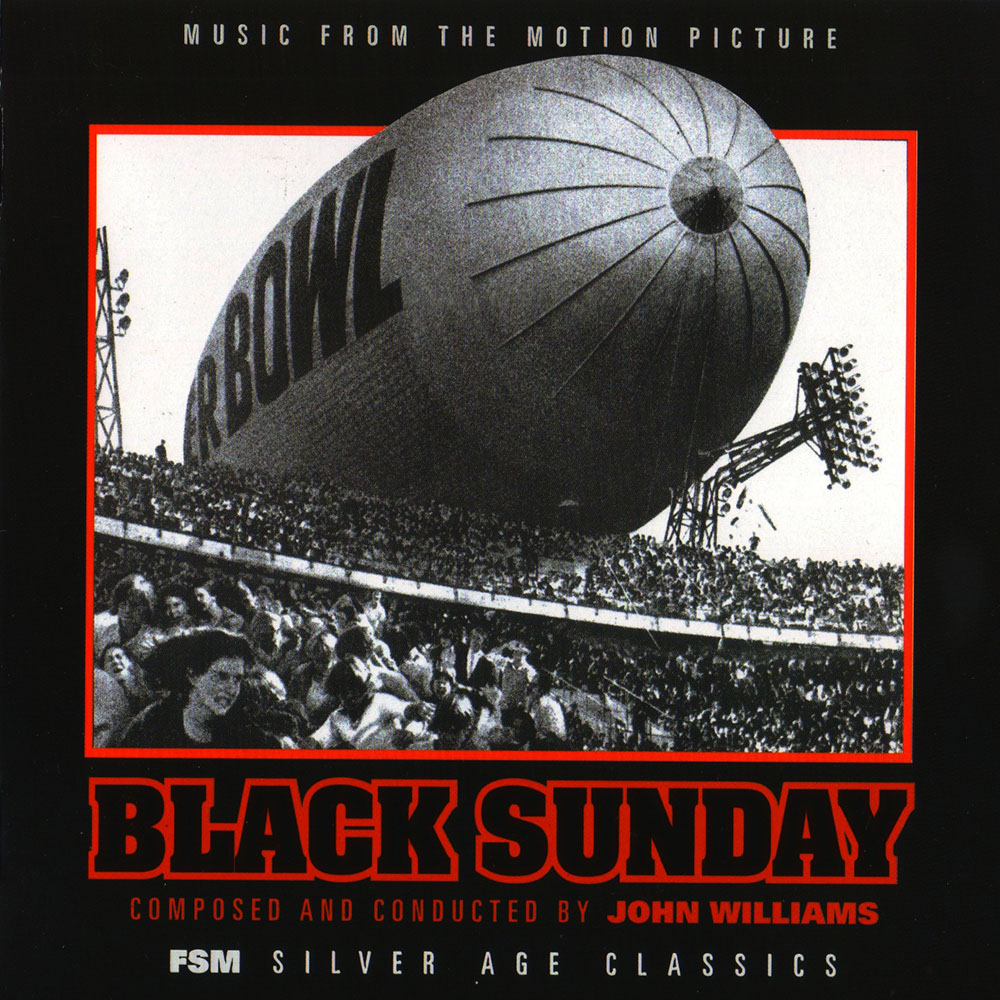
Black Sunday – music by John Williams
 Let’s say it’s the 1970s, and you’re doing a movie about a plot to kill a lot of people at the Super Bowl – a movie that won’t wind up on MST3K. A disaster movie, a well-worn and dying breed at the time, one that requires a big, dramatic orchestral score. Who do you call? You’ve probably got one John Williams – the man best known at the time as the maestro behind Jaws – on speed dial. (This is really more of a figure of speech than anything – you probably call the switchboard operator downstairs from your posh office on the studio lot and have her call Williams for you, because speed dial hasn’t been invented yet. Damned inconvenient.) That seems to have been the case for Black Sunday, which has just been released by Film Score Monthly.
Let’s say it’s the 1970s, and you’re doing a movie about a plot to kill a lot of people at the Super Bowl – a movie that won’t wind up on MST3K. A disaster movie, a well-worn and dying breed at the time, one that requires a big, dramatic orchestral score. Who do you call? You’ve probably got one John Williams – the man best known at the time as the maestro behind Jaws – on speed dial. (This is really more of a figure of speech than anything – you probably call the switchboard operator downstairs from your posh office on the studio lot and have her call Williams for you, because speed dial hasn’t been invented yet. Damned inconvenient.) That seems to have been the case for Black Sunday, which has just been released by Film Score Monthly.
Black Sunday is an oddity in Williams’ repertoire – aside from diehard Williams fans, not a lot of people know it’s even there. The movie was released early in 1977 by Paramount, and as is well known by now, another movie hit theaters in May 1977 which all but erased Black Sunday from the public film-going consciousness, a movie that also had a John Williams score. As such, Black Sunday has the odd distinction of being the only post-Jaws Williams soundtrack that has never been released – not even on vinyl or any other medium – until now.
And it was definitely worth the wait: there’s little in the Black Sunday soundtrack that sounds dated; only one distinctively ’70s-style source cue and the end credit suite, played over a gentle, mid-tempo ’70s-style soft rock beat, give the game away (and in any case, the typically extensive Film Score Monthly liner notes reveal that this version wasn’t used in the final edit of the film; another mix, minus the pop elements, is presented here but also went unused). The vast majority of the music sits nicely between Jaws and Star Wars, with menacing, brooding themes for the building suspense, and Williams’ signature style of action music, though it takes on a more worried tone than his often  celebratory style.
celebratory style.
The Black Sunday soundtrack is a lost gem from the Williams repertoire, and fans of his music from this era won’t be let down – even if the music comes from a movie that isn’t usually mentioned in the same breath as Williams’ more, ahem, super efforts.
- Beirut (0:37)
- Commandos Arrive (1:14)
- Commandos Raid (5:30)
- It Was Good / Dahlia Arrives / The Unloading (3:12)
- Speed Boat Chase (1:51)
- The Telephone Man / The Captain Returns (2:13)
- Nurse Dahlia / Kabakov’s Card / The Hypodermic (3:30)
- Moshevsky’s Dead (1:56)
- The Test (1:56)
- Building The Bomb (1:53)
- Miami / Dahlia’s Call (2:26)
- The Last Night (1:28)
- Preparations (2:43)
- Passed (0:31)
- The Flight Check (1:50)
- Airborne / Bomb Passes Stadium (1:45)
- Farley’s Dead (1:33)
- The Blimp and the Bomb (3:12)
- The Take Off (1:43)
- Underway (0:39)
- Air Chase, Part 1 (1:12)
- Air Chase, Parts 2 & 3 – The Blimp Hits (7:19)
- The Explosion (2:36)
- The End (2:19)
- Hotel Lobby (source) (1:47)
- Fight Song #1 (0:50)
- Fight Song #2 (1:48)
- The End (Alternate) (2:17)
- The Explosion (Revised Ending) (2:11)
Released by: Film Score Monthly
Release date: 2010
Total running time: 64:01
Rubber Universe – Parliament Of Fooles
 A few years ago, I raved at great length about L.E.O., a loose collective of (largely) indie label power-pop veterans joining forces to pay a “stylistic” tribute to Electric Light Orchestra without covering any of the band’s existing songs. I’ve always held ELO and Alan Parsons Project in a similarly high esteem – both of them routinely turning out engrossing, lush music with stellar production – so it’s good to find Rubber Universe, a band which offers up a similar “stylistic tribute” to Parsons.
A few years ago, I raved at great length about L.E.O., a loose collective of (largely) indie label power-pop veterans joining forces to pay a “stylistic” tribute to Electric Light Orchestra without covering any of the band’s existing songs. I’ve always held ELO and Alan Parsons Project in a similarly high esteem – both of them routinely turning out engrossing, lush music with stellar production – so it’s good to find Rubber Universe, a band which offers up a similar “stylistic tribute” to Parsons.
Where it was easy to figure out the object of L.E.O.’s musical affections, Rubber Universe is almost like a tribute – or, better yet, a whole new entry – to prog rock in general. The band states up front that their chief inspiration was Parsons, but in a couple of places (namely on the tracks “Paint My World” and “Nine Minutes ‘Till Midnight”) they also remind one forcefully of the Moody Blues at the height of their early ’70s experimentation (i.e. when their every release was mind-blowing and not just in service of a paint-by-numbers tour), and occasionally – especially in those songs with a healthy dose of female vocals – Clannad comes to mind.
Not that Rubber Universe is slavishly imitating anyone. The admission to having sprung from a tribute/cover band may be a way to automatically grab the attention of a certain fanbase, but Parliament Of Fooles is a fresh new entry in the prog rock pantheon on its own; the whole “former cover band” line in the publicity material may end up being counterproductive. The project (no pun intended) may have started as a cover band that wanted to do something original, but while Parsons fans will appreciate it, it’s nothing that screams “Hey, they’re trying to sound like the Alan Parsons Project.”
Though in a few places, they kinda do, with a little help from their friends: Project guitar god Ian Bairnson contributes to one track, while Godfrey Townsend, Parsons’ current touring guitarist, plays on another. The real coup, however – if those two weren’t enough to lend it the seal of Parsons Project authenticity – is a spoken-word intro for “Let Me Rule Your Heart” by the Project’s most famous vocalist and co-founder, the late Eric Woolfson.
If there’s one trap that Parliament Of Fooles falls victim to, it’s a tendency for most of the songs to hover in the same mid-tempo territory. The good news is that, when a song that breaks that mold comes along (i.e. “Romance Of The Illusion”), it instantly stands out, but much of the album sticks around the same tempo; any second effort from Rubber Universe would do well to vary things a bit more.
But for a freshman outing by a new band, especially one that has one hell of a musical and production pedigree to live up to, built into its mission statement, Rubber Universe is an outfit that bears close  watching – and repeat listening. Though fans of the Alan Parsons Project, they’ve proven that they’re more than ready to carve their own path, and with Parsons’ own output having dropped to less-than-prodigious levels in the past 20 years, I’d welcome a new entity making music with the same expansive feel.
watching – and repeat listening. Though fans of the Alan Parsons Project, they’ve proven that they’re more than ready to carve their own path, and with Parsons’ own output having dropped to less-than-prodigious levels in the past 20 years, I’d welcome a new entity making music with the same expansive feel.
- Negative Spaces (4:23)
- Dream Catcher (6:53)
- Romance Of The Illusion (2:16)
- Madness In Slumberland (4:18)
- Garden Of Earthly Delights (3:54)
- Let Me Rule Your Heart featuring Eric Woolfson (5:36)
- Paint My World (3:35)
- We Insist (Place De Greve Mix) (5:05)
- Goodbye My Love (2:02)
- Trying To Go On (4:40)
- Nine Minutes ‘Till Midnight featuring Godfrey Townsend (4:04)
- Parliament Of Fooles featuring Ian Bairnson (5:47)
Released by: Rubber Universe
Release date: 2008
Total running time: 52:33
Tim Finn – North, South, East, West…: Anthology
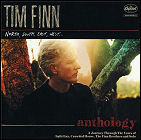 It’s something of an understatement to say that Tim Finn has earned a best-of album by now. The only catch is that it’s taken so long that there’s probably a whole generation in New Zealand – never mind everywhere else – asking “Tim who?” Hence, North, South, East, West… has a bit of an identity crisis: it’s not just a Tim Finn compilation, but crams in the better part of a best of Split Enz best-of album and selections from Crowded House (well, after a fashion) and the Finn Brothers, in addition to the obligatory new songs designed to hook in everyone who’s already bought all of Tim’s previous work.
It’s something of an understatement to say that Tim Finn has earned a best-of album by now. The only catch is that it’s taken so long that there’s probably a whole generation in New Zealand – never mind everywhere else – asking “Tim who?” Hence, North, South, East, West… has a bit of an identity crisis: it’s not just a Tim Finn compilation, but crams in the better part of a best of Split Enz best-of album and selections from Crowded House (well, after a fashion) and the Finn Brothers, in addition to the obligatory new songs designed to hook in everyone who’s already bought all of Tim’s previous work.
With that in mind, you have to forgive North, South, East, West…‘s inherent schizophrenia. The one common thread linking all of this very disparate material is Finn’s extremely versaitle voice. Whether it’s the very orchestrated sound of Split Enz or the relatively stripped-down guitar wash of Crowded House or the Finn Brothers, Finn’s voice cuts through the whole mix every time. His solo work has darted back and forth between more ornamented, Enz-like songs and more acoustic fare, so even if you set aside his non-solo projects, there’s no one sound dominating the entire 2-CD set.
The obligatory new material includes songs we haven’t heard before, and new recordings of songs that we have. Finn covers Split Enz’s “Stuff And Nonsense” as a duet with Missy Higgins, and gives Crowded House’s “It’s Only Natural” a similar treatment with Bic Runga riding shotgun. He also covers the Crowded House hit-in-some-parts-of-the-world “Weather With You” with Neil and Liam Finn. Also included are very stripped-down new versions of “So Deep” (from his very-produced, dance-rhythm-heavy second solo album Big Canoe) and Crowded House’s “How Will You Go”, and an instrumental piano cover of a portion of Split Enz’s “Poor Boy”. I felt that a partial cover was a little bit of a cheat (especially when it’s done so well), and “So Deep” already wasn’t my favorite song from Big Canoe, and it doesn’t really benefit from the toned-down rethink. I’m much more partial to “How Will You Go” in its original form, so this new recording, relieved of most of its beautiful vocal harmonies, certainly doesn’t supplant the original. It’s interesting to note that none of the Crowded House songs on this collection are the original recordings – all of them are re-interpretations.
Fortunately, the genuinely new tracks are a treat: “Into The Water” and especially the jumpy “Light Years Away” are up there with the best of Finn’s output over the past decade, and “Nothing Unusual” winds up being a kind of theme song for the whole compilation: it borrows the main riff from “Many’s The Time” and namechecks Enz chestnuts like “Maybe” and “Malmsbury Villa”, and the lyrics talk about the inspiration for songs in general – it’s a song about when one writes and performs songs, a bit of a meta-song, and a pleasant one at that.
Listening back to the songs chosen from Finn’s large body of solo work, I have to say that generally, the songs are very well-chosen; it seems like Big Canoe and Finn’s self-titled 1989 album were buried for some reason (and I still count the latter among his very best solo work), and his work from the musical stage production Steel City isn’t represented at all, but as many labels as Finn has  been on over the years there may be issues there (which may also explain the Crowded House oddity noted above). Once the compilation moves on to music from 1993’s Before & After, things tend to line up, more or less, with the Tim Finn best-of mixes that I’ve been creating for myself for years. Considering how hard it’s become to find some of Tim Finn’s material, this compilation is probably a good idea for those curious about his work.
been on over the years there may be issues there (which may also explain the Crowded House oddity noted above). Once the compilation moves on to music from 1993’s Before & After, things tend to line up, more or less, with the Tim Finn best-of mixes that I’ve been creating for myself for years. Considering how hard it’s become to find some of Tim Finn’s material, this compilation is probably a good idea for those curious about his work.
Disc One
- I See Red performed by Split Enz (3:17)
- My Mistake performed by Split Enz (3:02)
- Poor Boy performed by Split Enz (3:23)
- Six Months In A Leaky Boat performed by Split Enz (4:23)
- I Hope I Never performed by Split Enz (4:36)
- Dirty Creature performed by Split Enz (4:01)
- Maybe performed by Split Enz (2:53)
- Stuff And Nonsense performed by Tim Finn & Missy Higgins (3:27)
- Fraction Too Much Friction (4:10)
- Made My Day (3:20)
- So Deep (4:15)
- How’m I Gonna Sleep (3:52)
- Not Even Close (4:18)
- Many’s The Time (4:20)
- Persuasion (3:52)
- Into The Water (3:14)
- Nothing Unusual (4:02)
Disc Two
- Weather With You performed by Tim, Neil & Liam Finn (3:43)
- How Will You Go (2:59)
- It’s Only Natural performed by Tim Finn & Bic Runga (3:44)
- Underwater Mountain (3:55)
- Dead Man (4:04)
- What You’ve Done (3:43)
- Subway Dreaming (4:16)
- Angels’ Heap performed by the Finn Brothers (2:50)
- Disembodied Voices performed by the Finn Brothers (3:37)
- Luckiest Man Alive performed by the Finn Brothers (3:59)
- Winter Light (4:11)
- Couldn’t Be Done (2:53)
- Astounding Moon (3:36)
- Straw To Gold (3:58)
- Out Of This World (3:01)
- The Saw And The Tree (4:05)
- Light Years Away (3:09)
- Poor Boy (instrumental) (1:31)
Released by: Capitol / EMI
Release date: 2009
Disc one total running time: 64:25
Disc two total running time: 63:14
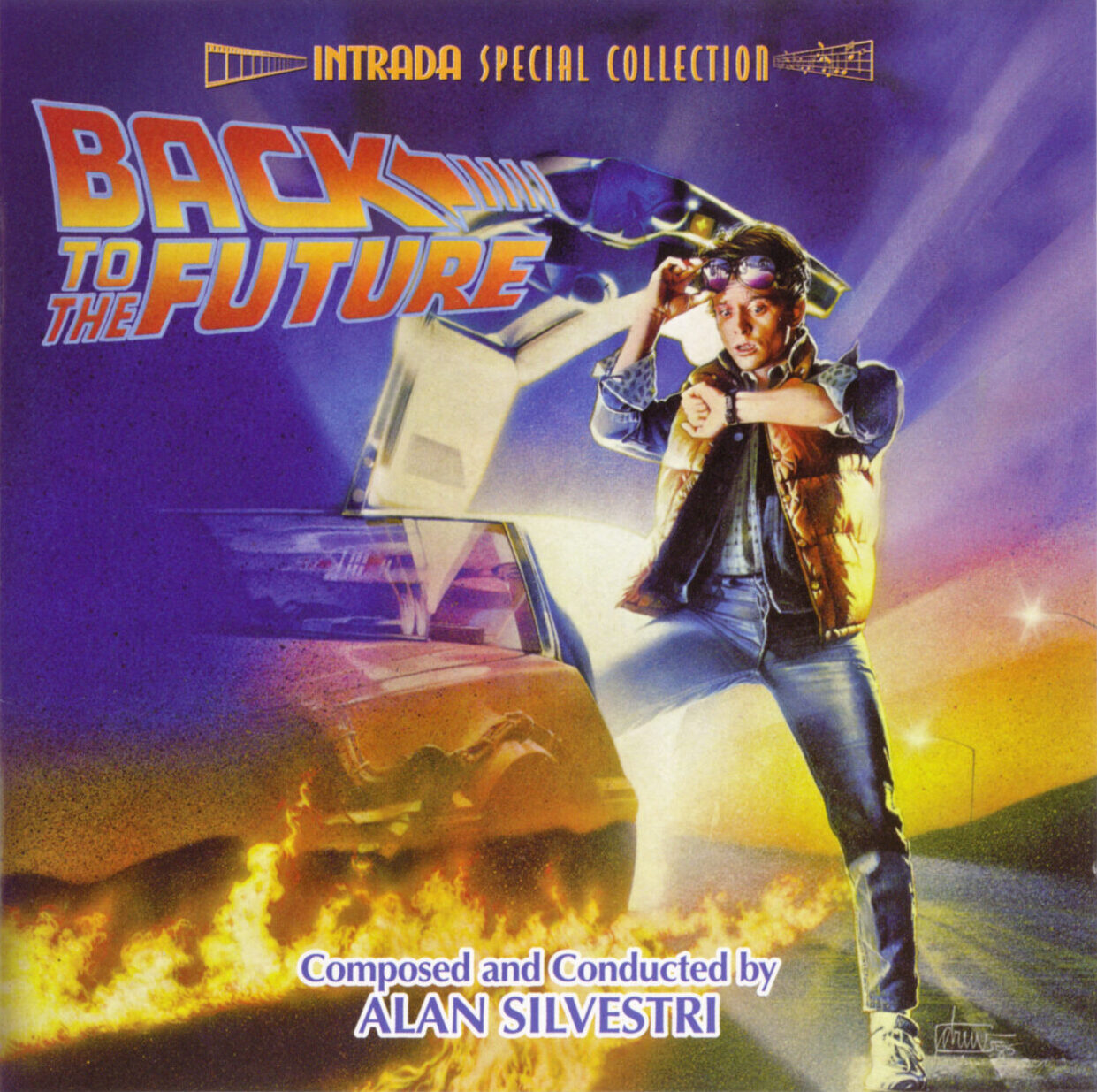
Back To The Future – music by Alan Silvestri
Back To The Future is back! It’s not that there’s never been a Back To The Future soundtrack before; on the contrary, it was quite a hit, leaning heavily on the popular songs by Huey Lewis and the News. It featured a couple of snippets of the orchestral score by Alan Silvestri, and the rest has remained unreleased until now. That’s why this is a big deal. Fans of ’80s movie music speak in glowing terms of such things as the Star Wars and Indiana Jones trilogies, Excalibur, the Conan movies, songtracks such as The Breakfast Club (and just about anything else John Hughes produced or directed), and the increasingly synth-dominated scoring of movies like Blade Runner. I’m not sure that Alan Silvestri’s music for this movie and its sequels have ever really gotten their due. This 2-CD set should rewrite that particular bit of history nicely – Doc Brown would be proud.
Soundtrack specialty label Intrada felt it was a big deal too – big enough to merit a 2-CD deluxe release, and big enough to take the very unusual step of not limiting Back To The Future‘s print run to 3,000 copies, the typical allocation for a soundtrack release, especially a “vintage” release like this. Very much like this year’s expanded re-release of the soundtrack from Star Trek II, Intrada was aware of – and is banking on – wider interest in this soundtrack than an older score would normally see.
Already having more than a passing familiarity with Back To The Future and its sequels, I was amazed with how many surprises awaited me in this package. I learned quite a few things from the booklet that I didn’t know before, and the music itself was a real revelation in places. How the theme from Back To The Future has managed to escape being enshrined among the movie themes that the general public considers “hummable” is beyond me – it’s very memorable, and Silvestri proves – as he does in much of his other work – that it’s infinitely adaptable: fast, slow, major keys, minor keys, it’s carefully crafted to fit any of those needs.
But there’s much more here that’s memorable: Silvestri’s playful three-note mysterioso “stingers” practically put you right back in the movie, and with action setpieces like “Skateboard Chase” and especially the amazing feat of wall-to-wall action music that is “Clocktower”, this isn’t music that’ll put you to sleep. I was reminded of how dramatic some of the scoring is for a movie that most viewers remember as a comedy. Silvestri does a lot of the legwork in selling some of the movie’s most serious, high-jeopardy moments.
The entire score from Back To The Future fits on the first disc, so what’s on the second disc? It’s an early version of key moments of the movie score. The early version is still recorded with a full orchestra; it’s not an early enough draft to be rough synth sketches or anything less evolved. But there are changes in timing (sometimes sections of the music were replaced to accomodate editing changes) and changes in emphasis: the “’55 Town Square” cue is presented in two early versions, one with trumpets and French horns at full blast, and one with muted brass, and the difference in feel is remarkable. Some of the rescored sections are actually significantly different; Silvestri “lightened” the music in some places for the final version, with the original cues sometimes being a little too dramatic and dark. For the most part, it’s the same music, with changes in the emotional tone – a treat for listeners who are students in how films are scored.
 The pop music used in Back To The Future has been more than adequately released, so this presentation of the orchestral score is long overdue – and with the early drafts and extensive liner notes, Intrada has made the wait worthwhile. We can’t really go back in time to give this soundtrack its just recognition down through the years, but this is more than good enough.
The pop music used in Back To The Future has been more than adequately released, so this presentation of the orchestral score is long overdue – and with the early drafts and extensive liner notes, Intrada has made the wait worthwhile. We can’t really go back in time to give this soundtrack its just recognition down through the years, but this is more than good enough.
- Logo (0:23)
- DeLorean Reveal (0:49)
- Einstein Disintegrated (1:25)
- ’85 Twin Pines Mall (4:45)
- Peabody Barn / Marty Ditches DeLorean (3:13)
- ’55 Town Square (1:20)
- Lorraine’s Bedroom (0:49)
- Retrieve DeLorean (1:17)
- 1.21 Jigowatts (1.39)
- The Picture (1:08)
- Picture Fades (0:20)
- Skateboard Chase (1:41)
- Marty’s Letter (1:21)
- George To The Rescue, Part 1 (0:53)
- Marvin Be-Bop (source cue) (2:27)
- George To The Rescue, Part 2 (2:37)
- Tension / The Kiss (1:35)
- Goodnight Marty (source cue) (1:33)
- It’s Been Educational / Clocktower (10:33)
- Helicopter (0:21)
- ’85 Lone Pine Mall (3:49)
- 4 x 4 (0:43)
- Doc Returns (1:16)
- Back to the Future (End Credits) (3:18)
Disc Two
- DeLorean Reveal (0:43)
- Einstein Disintegrated (1:26)
- Peabody Barn (2:08)
- Marty Ditches DeLorean (1:58)
- ’55 Town Square #1 (Trumpet Open) (1:37)
- ’55 Town Square #2 (Trumpet Mute) (1:38)
- Retrieve DeLorean (1:17)
- 1.21 Jigowatts (1:38)
- The Picture (1:09)
- Skateboard Chase (1:42)
- George To The Rescue (4:16)
- Tension / The Kiss (1:43)
- Clocktower (10:57)
- ’85 Lone Pine Mall (3:49)
- Doc Returns (1:22)
- Ling Ting Ring (unused source cue) (2:01)
Released by: Intrada
Release date: 2009
Disc one total running time: 49:15
Disc two total running time: 39:24
Avatar – music by James Horner
![]() I always joke – well, it’s kind of a joke – that it’s not a James Horner score unless it sounds remarkably like a previous James Horner score. It was easy to make that joke in the ’80s; after Battle Beyond The Stars, a rather good score which was shoehorned into the same stylistic box as Star Trek: The Motion Picture by Horner’s boss, producer Roger Corman. That music led Horner to work on Star Trek for real with Star Trek II: The Wrath Of Khan, and he then used much the same formula (and damn near the same music) for Star Trek III, Krull and his first gig with up-and-coming director James Cameron, Aliens. The similarity was strong enough that even people who, unlike your reviewer here, don’t listen to soundtrack music all day long noticed the similarities. To be fair, Horner has graced us with solid slices of musical Americana such as The Journey Of Natty Gann and Apollo 13 and perhaps the most popular soundtrack in history that doesn’t have the words “Star” and “Wars” anywhere on the cover, Titanic (also for Cameron).
I always joke – well, it’s kind of a joke – that it’s not a James Horner score unless it sounds remarkably like a previous James Horner score. It was easy to make that joke in the ’80s; after Battle Beyond The Stars, a rather good score which was shoehorned into the same stylistic box as Star Trek: The Motion Picture by Horner’s boss, producer Roger Corman. That music led Horner to work on Star Trek for real with Star Trek II: The Wrath Of Khan, and he then used much the same formula (and damn near the same music) for Star Trek III, Krull and his first gig with up-and-coming director James Cameron, Aliens. The similarity was strong enough that even people who, unlike your reviewer here, don’t listen to soundtrack music all day long noticed the similarities. To be fair, Horner has graced us with solid slices of musical Americana such as The Journey Of Natty Gann and Apollo 13 and perhaps the most popular soundtrack in history that doesn’t have the words “Star” and “Wars” anywhere on the cover, Titanic (also for Cameron).
Titanic also had the dubious distinction, at the time, of being the most expensive movie ever made (one which, luckily, also managed to make more of that money back than any more that came before it). When Cameron finally started production on Avatar – at $400,000,000, the new “most expensive movie ever” record-holder – it’s not surprising that Cameron called on the composer of his previous big-screen opus.
While there are a few rapid-fire brass blasts that immediately remind one of Horner’s works as far back as The Wrath Of Khan, generally the music from Avatar just about lives up to the hype of being something that Horner put a lot of time and thought into: it doesn’t actively sound like his previous works. In fact, it achieves something unexpected – at a time when world-music-inspired sounds are standing in for the otherworldly in nearly every other SF film/TV score out there (see: Battlestar Galactica, District 9, Lost, etc. etc. etc.), strongAvatar manages to not sound like anything else out there. I think this revelation hit me about the time I heard percussion that seemed to be imitating hummingbird wings: that’s kinda neat.
Unusually for a major label soundtrack release, Avatar is filled to the brim, and not with tiny bite-sized cues either: one track, “War”, weighs in heavier than 11 minutes, and those 11 minutes are neither typical action music nor typical James Horner action music. The Avatar score interestingly treats mind-expanding, contemplative moments as little triumphs, but doesn’t bestow triumphant bombast on moments of conflict. Horner and Cameron were clearly on the same page thematically, and the music serves the movie well.
 So I’ll admit it: James Horner has returned to science fiction, and aside from maybe all of twenty seconds, it doesn’t sound like any movie he’s scored in that genre before. What’s more, it fits the movie like a glove, and it stands up to a listen on its own. I may yet find a reason to drop my skepticism and become a James Horner fan after all.
So I’ll admit it: James Horner has returned to science fiction, and aside from maybe all of twenty seconds, it doesn’t sound like any movie he’s scored in that genre before. What’s more, it fits the movie like a glove, and it stands up to a listen on its own. I may yet find a reason to drop my skepticism and become a James Horner fan after all.
- You Don’t Dream In Cryo (6:09)
- Jake Enters His Avatar World (5:23)
- Pure Spirits Of The Forest (8:50)
- The Bioluminescence Of The Night (3:36)
- Becoming One Of “The People” / Becoming One With Neytiri (7:41)
- Climbing Up Iknimaya / “The Path To Heaven” (3:14)
- Jake’s First Flight (4:48)
- Scorched Earth (3:30)
- Quaritch (5:00)
- The Destruction Of Hometree (6:44)
- Shutting Down Grace’s Lab (2:46)
- Gathering All The Na’Vi Clans For Battle (5:12)
- War (11:19)
- I See You (Theme From Avatar) (4:16)
Released by: Atlantic
Release date: 2009
Total running time: 78:28
The Prisoner – music by Rupert Gregson-Williams
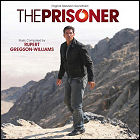 The soundtrack from AMC’s recent remake of The Prisoner is very much like the show itself: it starts out sounding as though it might go to some interesting places, and ends up plodding along into territory that’s largely pointless and meandering. I’ve tried to give every remake of late a fair shake; V and Battlestar Galactica were probably due for a rethink, and Galactica certainly delivered the goods. The problem with Galactica being so wildly successful is that it’s probably prompted more studio suits to green-light reboots of existing franchises that just don’t need a revisitation. The Prisoner is certainly in that category: while certain elements of the original 1960s series are signal flares for the era during which the show was made, those elements were far outweighed by themes both timeless and troubling. The original show is still universally hailed as a milestone of TV storytelling – as the original DVD releases said on the box, “television’s first masterpiece.” With all of that praise, who was bucking for a remake?
The soundtrack from AMC’s recent remake of The Prisoner is very much like the show itself: it starts out sounding as though it might go to some interesting places, and ends up plodding along into territory that’s largely pointless and meandering. I’ve tried to give every remake of late a fair shake; V and Battlestar Galactica were probably due for a rethink, and Galactica certainly delivered the goods. The problem with Galactica being so wildly successful is that it’s probably prompted more studio suits to green-light reboots of existing franchises that just don’t need a revisitation. The Prisoner is certainly in that category: while certain elements of the original 1960s series are signal flares for the era during which the show was made, those elements were far outweighed by themes both timeless and troubling. The original show is still universally hailed as a milestone of TV storytelling – as the original DVD releases said on the box, “television’s first masterpiece.” With all of that praise, who was bucking for a remake?
The answer is simple: the studio that still held the copyright on Patrick McGoohan’s original concept and 17 episodes. Surely a modernization of the story would find ample material to dramatize in a post-9/11 world, with the themes of identity, staying in lockstep with the popular majority and bucking the system havingly only gained incredible significance in the intervening years. Instead, what emerged from the new Prisoner was a muddle of half-baked ideas with little or no resonance, failed attempts at fan-pleasing callbacks to the original series that more often than not seemed grafted on at the last minute, and murky vagueness standing in for the original show’s symbolism and mystery. Replace the original Number Six’s seething, barely-able-to-keep-it-from-bubbling-over rage at his predicament with a new Number Six who just really didn’t want to be in the Village (but can’t remember why), and the new Prisoner is just an ill-thought-out mess that isn’t remotely a patch on McGoohan’s show. Hopefully the new show won’t poison the ongoing mystique of its vastly superior forebear.
One of the few things I did find to like about AMC’s Prisoner was its frequently-trippy musical score. Just about every note of original score and library music used in the ’60s version has been released, re-released, stamped, filed, indexed, numbered and critically dissected, and it’s well known that the disorienting near-elevator-muzak tone of the original show’s music was intended as part of its overall unsettling effect. Rupert Gregson-Williams opts for a more modern tone, but keeps some of that unsettling feel in many tracks by layering in backward elements that intertwine with the main melodic and harmonic ideas. Early tracks on the soundtrack CD are quite interesting to listen to, and demand more than one listening to really catch how all the sounds, both forward and backward, fit together.
Sadly, many of the later tracks are bogged down in a kind of non-specific, quasi-Mediterranean millieu, with the appropriate meandering string instruments that have been all the rage of late with non-orchestral scoring. There are still occasional orchestral elements, but the latter half of the CD is quite frankly not really relaxing, but just plain sleepy. The main theme for the series as a whole is a strange mix of ’70s keyboard sounds and modern electronics – and it barely breaks out from the score itself to do what a main theme should (i.e. provide a sonic signature that lets you know, even from the TV in the next room, that The Prisoner is on, and you need to report to the Village immediately).
Ironically, it’s only a couple of source cues which turn out to be the closest that this score comes to the tone of the original show; several songs appeared in the AMC series which aren’t included here, such as selections from Brian Wilson’s Smile.
I can’t muster much more than a 2 rating for this soundtrack; there’s simply too much of it that, rather like the show, loses its way and goes off into the desert, never to return. I can’t even really fault the  composer, as I can’t imagine the scripts and footage providing enough inspiration for anyone to create music that salvages the entire endeavour (see also: the Star Trek: The Motion Picture effect). Sad to say, this soundtrack is probably the most worthwhile thing to come from the 2009 remake of The Prisoner.
composer, as I can’t imagine the scripts and footage providing enough inspiration for anyone to create music that salvages the entire endeavour (see also: the Star Trek: The Motion Picture effect). Sad to say, this soundtrack is probably the most worthwhile thing to come from the 2009 remake of The Prisoner.
- Explosion (1:42)
- Everybody Knows Everybody (2:29)
- The Ocean (5:03)
- Two (5:58)
- Shadows And Nightmares (3:05)
- 909 (3:36)
- Tour Bus (0:57)
- Walk With Me (2:25)
- 313 (2:58)
- Lucy (6:17)
- Six Investigates (1:30)
- Wonkers (0:59)
- The Ruins (3:03)
- Blackmail (3:28)
- Escape Resort (1:21)
- One Night Together (4:39)
- Wedding Day (3:23)
- Waking Up (2:16)
- Helen (6:36)
- In The Church (5:53)
- Suicide (2:48)
- I Am Not A Number (3:15)
- The Prisoner Titles (0:37)
Released by: Varese Sarabande
Release date: 2009
Total running time: 74:18
8 Bit Weapon & ComputeHer – It’s A Chiptune Holiday!
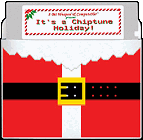 A fun little EP released just in time for the holiday season, It’s A Chiptune Holiday! is a selection of traditional Christmas music, done in old-school video game style with 8 Bit Weapon’s usual arsenal of custom-programmed classic console sound chips.
A fun little EP released just in time for the holiday season, It’s A Chiptune Holiday! is a selection of traditional Christmas music, done in old-school video game style with 8 Bit Weapon’s usual arsenal of custom-programmed classic console sound chips.
“Deck The Halls” kicks things off with harmonized vocoder vocals – it’s like a cheerful choir of Christmas-caroling robots. “Jingle Bells” and “God Rest Ye Merry Gentlemen” also have robotic vocals, though the latter has a kind of strange diction that makes me wonder if it really is a voice synthesizer as opposed to a human singer’s processed vocals.
The instrumentals are a treat too; “O Christmas Tree” is given a polyphonic arrangement that makes it sound like a “win” tune from Pole Position; “Ave Maria” actually comes closest to what I was expecting to hear from an EP of 8-bit Christmas tunes.
 The only problem with It’s A Chiptune Holiday! is that it’s just too short! I instantly thought of about a dozen other Christmas tunes that would sound great with the 8 Bit Weapon treatment; I realize that it’d mean venturing into non-public-domain territory, but I can just about hear a chiptune version of “Christmastime Is Here” from Vince Guaraldi’s Charlie Brown Christmas special soundtrack in my head.
The only problem with It’s A Chiptune Holiday! is that it’s just too short! I instantly thought of about a dozen other Christmas tunes that would sound great with the 8 Bit Weapon treatment; I realize that it’d mean venturing into non-public-domain territory, but I can just about hear a chiptune version of “Christmastime Is Here” from Vince Guaraldi’s Charlie Brown Christmas special soundtrack in my head.
The good news is, I hear they’ve already scheduled Christmas for next year – you’ve got 12 months to get on the case, 8 Bit Weapon!
- Deck The Halls (Nos Galan) (1:52)
- Hanukkah (Festival Of Lights) (1:01)
- O Christmas Tree (O Chanukah) (1:31)
- Jingle Bells (One Horse Open Sleigh) (1:14)
- Joy To The World (2:09)
- Greensleeves (What Child Is This) (1:51)
- God Rest Ye Merry Gentlemen (2:13)
- Ave Maria (The Well-Tempered Clavier) (3:25)
Released by: 8 Bit Weapon
Release date: 2009
Total running time: 15:16
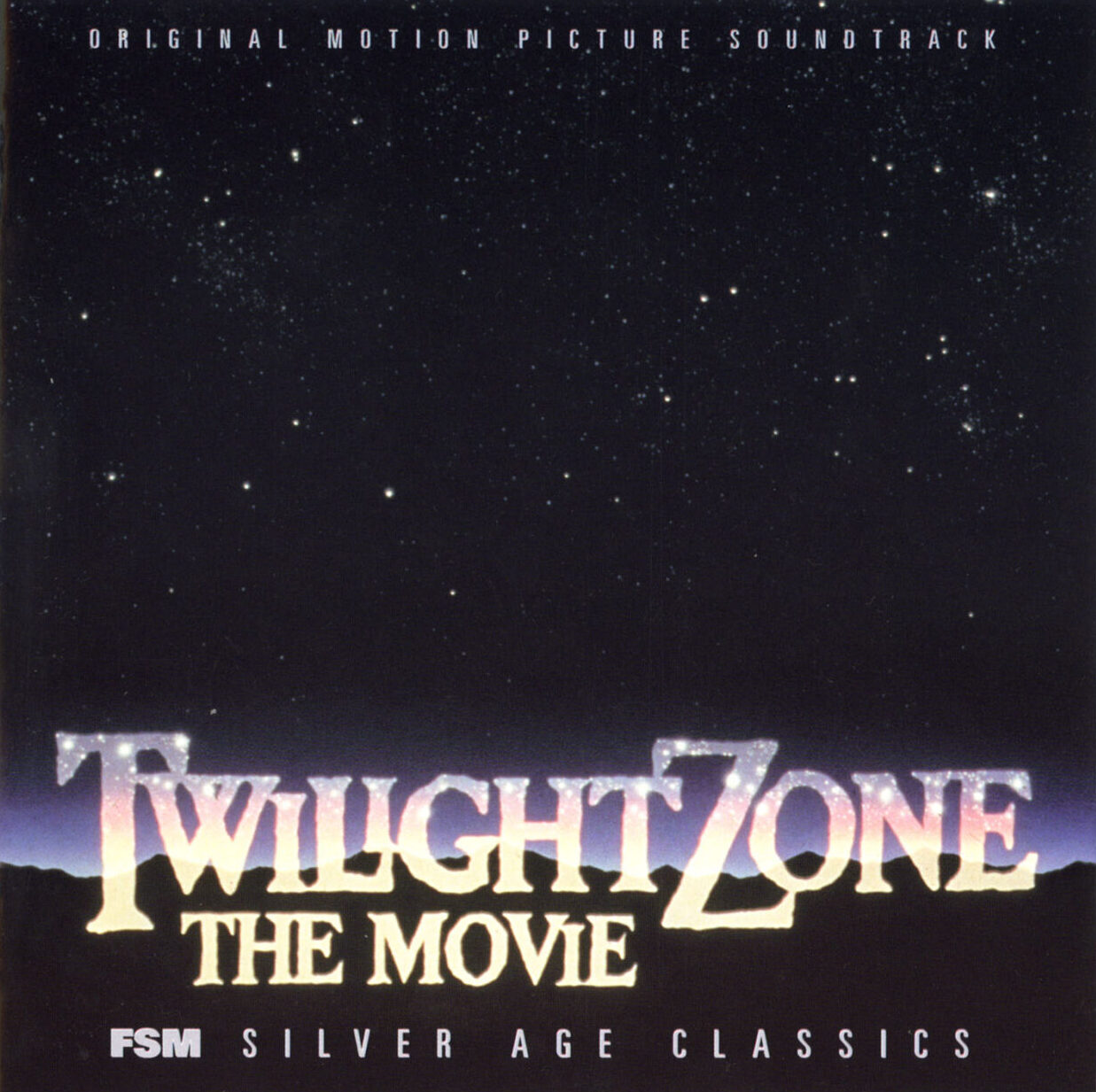
Twilight Zone: The Movie – music by Jerry Goldsmith
Returning full-circle to the early days of his career as a contract composer working for one studio or another, Jerry Goldsmith was no stranger to The Twilight Zone, having devised the music for some of its classic television installments. By the time he was tapped for the big-screen re-interpretation of it, however, Goldsmith was one of the major players in movie music…and in 1983, just a few years after Aliens and Star Trek: The Motion Picture and their knockout scores, that’s putting it mildly. According to the information-dense booklet that’s become a hallmark of Film Score Monthly’s impressive CDs, Goldsmith was more than happy to return to this particular dimension of sight and sound. This CD gathers, for the first time, every note of music recorded for Twilight Zone: The Movie, including background source music and even leaving room for the suites that were specially recorded or edited together for the original 1983 album release (in the back of the booklet, a running order is included for those who wish to program their CD players to reflect the original LP running order).
If there’s a composer better suited to this unusual movie – which did its best to reflect its short-story-length episodic roots – I can’t imagine who it would be. Goldsmith is called upon to deliver, effectively, four distinctly different scores for one film, as well as framing sequences bookended by Marius Constant’s immortal Twilight Zone theme. What’s all the more impressive is that Goldsmith doesn’t seem to have changed a thing about the original theme, completely forgoing the opportunity to update it or broaden it for the big screen. This is one of the elements that really works toward making the film an integral chapter of the franchise: whether you’re talking about the music or the scripts, it doesn’t completely betray the source material just to cash in on the name (which it very easily could have – the movie languished in development hell for some time as its structure was endlessly debated at the studio).
The first story in the movie’s four-episode format, Time Out, receives a deceptively old-fashioned score: heavy on rumbling piano bass notes and an occasional snare drum cadence, it’s nothing that couldn’t have been done with the meager musical resources at Goldsmith’s command in the original TV series. Kick The Can, the second story, has a broader musical palette, but it accomplishes this by way of synths which were, even then, obviously synths.
The third story, It’s A Good Life, receives an unusual musical treatment to say the least – there are moments of beauty and wonder that sound like they might’ve emerged from the Star Trek: The Motion Picture score, and then there are Carl Stalling-inspired slices of cartoon whimsy that inevitably descend into something with a much more sinister feel. Jarring, but effective; “The House” is one of my favorite pieces of Goldsmith music from this epoch of his career.
The fourth and final story, Nightmare At 20,000 Feet, is the crowning glory of Twilight Zone: The Movie, revisiting a segment of the original series that starred William Shatner. In the big-screen iteration, however, John Lithgow is the increasingly paranoid passenger who rants and raves that he’s seen “a man on the wing of the plane!” Nightmare is one of my favorite pieces of early ’80s genre cinema, and it gets a devilishly devious musical treatment with plenty of scratchy fiddle and wavering, almost-theremin-like synthesizer to signify the gremlin that’s tearing the plane apart before Lithgow’s eyes. And speaking of gremlins, in between the big, brassy suspense cues, the creature also gets a musical signature that one can tell was rhythmically built upon by Goldsmith for Gremlins a year later – though not madly similar melodically, the rhythmic resemblance is undeniable. In Gremlins, the same rhythm gained a playful-but-sinister tone, but here, it’s just plain scary.
The bonus tracks include the edited-down suites from the original LP, previously unreleased songs recorded for the backgrounds of certain scenes (which, while seemingly out of place next to the orchestral score, were still written by Goldsmith), and a few alternate takes. It was mentioned at the beginning of this review, but the booklet is an outstanding source of behind-the-scenes info about both the movie and its music, including the original LP liner notes. Twilight Zone: The Movie was a major release from a major studio, and Film Score Monthly’s presentation more than does it justice.

- Main Title: The Twilight Zone Theme (0:48)
Time Out
- Questions / The Ledge (4:03)
- Yellow Star (3:57)
Kick The Can
- Harp and Love (1:27)
- Weekend Visit (1:34)
- Kick The Can (0:37)
- Night Games (1:54)
- Take Me With You / A New Guest (10:13)
It’s A Good Life
- The House (2:30)
- The Sister / I Didn’t Do It (1:22)
- Carbon Monster (3:08)
- That’s All, Ethel (1:48)
- No More Tricks (3:57)
Nightmare At 20,000 Feet
- Nervous Pills (2:39)
- No Smoking (2:07)
- On The Wing (1:21)
- A Face In The Window (2:11)
- Engine Failure (1:38)
- Overture: Twilight Zone Theme and End Title (6:03)
Bonus Tracks
- Nights Are Forever (3:36)
- Anesthesia (3:04)
- Questions / The Ledge (album edit) (3:03)
- Take Me With You / A New Guest (album edit) (5:03)
- That’s All Ethel (album edit) (4:29)
- Cartoon Music (1:27)
- A Face In The Window / Hungry Monster / Twilight Zone Theme (album edit) (4:58)
Released by: Film Score Monthly
Release date: 2009
Total running time: 78:57
7 Worlds Collide – The Sun Came Out
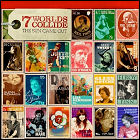 The first 7 Worlds Collide album (and DVD) chronicled an all-star gathering of international musicians who assembled quickly to play a few dates in Neil Finn’s stomping grounds; the album was culled from the live performances, and the superstar band (which included the likes of Pearl Jam’s Eddie Vedder) disbanded, after its shows raised money for charity. The second release under the 7 Worlds Collide banner retains the all-star band part of the formula, but the resulting double album is a creature of the studio, often under the watchful production eye of Neil Finn and/or the talent to which any given track is credited. There a few old faces and a few new ones as well: many of the guest musicians are drawn from a somewhat more local talent pool, with a number of names who may be well known in New Zealand but perhaps not so much outside of the south Pacific.
The first 7 Worlds Collide album (and DVD) chronicled an all-star gathering of international musicians who assembled quickly to play a few dates in Neil Finn’s stomping grounds; the album was culled from the live performances, and the superstar band (which included the likes of Pearl Jam’s Eddie Vedder) disbanded, after its shows raised money for charity. The second release under the 7 Worlds Collide banner retains the all-star band part of the formula, but the resulting double album is a creature of the studio, often under the watchful production eye of Neil Finn and/or the talent to which any given track is credited. There a few old faces and a few new ones as well: many of the guest musicians are drawn from a somewhat more local talent pool, with a number of names who may be well known in New Zealand but perhaps not so much outside of the south Pacific.
Virtually the entire Finn family is present, naturally; Neil Finn duets with his wife Sharon on “Little By Little”, a song about the rapid approach of an empty nest at home, and he also duets with Liam Finn, his son who’s carving out a respectable career as a solo artist, on “Learn To Crawl”. Liam also gets a solo turn in the twisty waltz “Red Wine Bottle”, while his younger brother Elroy (who has already been playing live with Crowded House) gets the studio to himself for “The Cobbler”, and while he hasn’t quite carved out the unique sound that Liam has, Elroy still bears watching – as with his older brother, his voice gives away his lineage. Tim Finn also turns in a pleasant solo song, “Riding The Wave.” Fans of the Finn family tree certainly won’t be disappointed by this collection.
Neil’s signature production style permeates nearly every other track on the album, too. It could be argued that The Sun Came Out is perhaps a little less varied in style than the previous 7 Worlds Collide project; with the whole thing in the studio under Finn’s aegis, it’s easy to tell who was at the wheel. This doesn’t detract from the fact that there are some fantastic songs here: Don McGlashan’s “Make Your Own Mind Up” and the KT Tunstall/Bic Runga duet “Black Silk Ribbon” are two of the best songs I’ve heard out of anyone, anywhere, all year long. Liam Finn’s “Red Wine Bottle” is a low-key number that sticks in your head, while the cheery lead track, Johnny Marr and Neil Finn’s “Too Blue”, is enough to brighten anyone’s mood. I also have to single out Jeff Tweedy’s “You Never Know” for special praise: the tune, the performance and the production almost achingly remind me of early ’70s George Harrison, and this is not a bad thing. At all.
If I have a single complaint with The Sun Came Out, it’s that the first disc is a pure pop adrenaline rush, while the second seems to slow down. It really doesn’t, but somehow the second CD lacks the “oomph” packed by the first disc (which literally doesn’t let up for its entire running time). And disc two is no slouch by any means – we get a new Neil Finn solo number (“All Comedians Suffer”), Tim’s and Elroy’s songs, KT Tunstall’s “Hazel Black”, and another Don McGlashan number, “Long Time Gone”. There’s no letdown in quality but somehow there’s a slight darkening of mood.
 But that’s a very minor quibble indeed; with the possible exception of Battlestar Galactica Season 4 (and let’s face it, in most cases these two projects are aimed at wildly different audiences), there’s not another two-disc set that’s going to give you this much enjoyment for the price – and once again, Finn & company are sharing the proceeds with charity, so there’s more feel-good to some of these feel-good songs than you might expect. Very, very highly recommended. (Now get back in the studio with Crowded House, Neil!)
But that’s a very minor quibble indeed; with the possible exception of Battlestar Galactica Season 4 (and let’s face it, in most cases these two projects are aimed at wildly different audiences), there’s not another two-disc set that’s going to give you this much enjoyment for the price – and once again, Finn & company are sharing the proceeds with charity, so there’s more feel-good to some of these feel-good songs than you might expect. Very, very highly recommended. (Now get back in the studio with Crowded House, Neil!)
- Too Blue – Johnny Marr with Neil Finn (4:01)
- You Never Know – Jeff Tweedy (4:18)
- Little By Little – Sharon Finn and Neil Finn (3:18)
- Learn To Crawl – Neil Finn & Liam Finn (4:59)
- Black Silk Ribbon – KT Tunstall & Bic Runga (3:48)
- Girl Make Your Own Mind Up – Don McGlashan (5:29)
- Run In The Dust – Johnny Marr (4:23)
- Red Wine Bottle – Liam Finn (4:26)
- The Ties That Bind Us – Phil Selway (3:22)
- Reptile – Lisa Germano (3:53)
- Bodhisattva Blues – Ed O’ Brien & Neil Finn (3:55)
- What Could Have Been – Jeff Tweedy (3:41)
Disc Two
- All Comedians Suffer – Neil Finn (4:28)
- Duxton Blues – Glenn Richards (3:35)
- Hazel Black – KT Tunstall (3:46)
- Riding The Wave – Tim Finn (3:32)
- The Witching Hour – Phil Selway (3:03)
- Over & Done – John Stirratt (3:41)
- A Change Of Heart – Bic Runga (3:14)
- Don’t Forget Me – Pat Sansone (3:38)
- Long Time Gone – Don McGlashan (4:02)
- The Cobbler – Elroy Finn (4:33)
- 3 Worlds Collide (3:06)
- The Water – Sebastian Steinberg (4:02)
Released by: Sony
Release date: 2009
Disc one total running time: 49:33
Disc two total running time: 44:40
FAB featuring MC Number 6 – The Prisoner
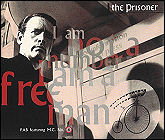 Produced with the blessing of Patrick McGoohan himself, this CD single is a lively remix/remake of Ron Grainer’s immortal theme from The Prisoner. Sound clips from the original series are sprinkled liberally throughout the song and become an integral part of its rhythm.
Produced with the blessing of Patrick McGoohan himself, this CD single is a lively remix/remake of Ron Grainer’s immortal theme from The Prisoner. Sound clips from the original series are sprinkled liberally throughout the song and become an integral part of its rhythm.
The best of the three tracks is the first, clocking in at about three and a half minutes; all three tracks incorporate the same ideas, but the second and third tracks are twice as long… and neither uses the extra time to expand on the musical or thematic ideas significantly. The succinctness of the original mix is, frankly, the best thing about it. The original elements of the music itself are very much a product of the times: think of the theme song from Cops, and you’ll have a good idea of the reggae-styled rap that kicks in about halfway through the song.
The best part of this remix is that someone really “got” the material. The clips are chosen well, and even the rap bit in the middle of the song dovetails thematically with The Prisoner’s over-arching themes of  freedom, entrapment and rebellion. This is a cut above a lot of TV theme remixes where random clips are shoveled in on top of a 140bpm reworking of the original music – this takes the ideas behind the original material and runs with them – successfully, in my opinion.
freedom, entrapment and rebellion. This is a cut above a lot of TV theme remixes where random clips are shoveled in on top of a 140bpm reworking of the original music – this takes the ideas behind the original material and runs with them – successfully, in my opinion.
- The Prisoner (Free Man Mix) (3:20)
- The Prisoner (Confidential Mix) (6:09)
- The Escape (Solitary Club Mix) (6:10)
Released by: Telstar Records
Release date: 1990
Total running time: 15:39
Jason Falkner – All Quiet On The Noise Floor
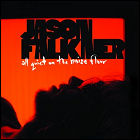 Yet another Jason Falkner solo album that has so far only been released in Japan (as of this writing, his previous album, I’m OK You’re OK, still has yet to hit our shores as anything other than an import), All Quiet On The Noise Floor may well be the best thing Falkner’s done since Can You Still Feel? Still drenching everything in a guitars-at-the-front-of-the-mix 1970s power pop style, Falkner’s songs are better this time around. Tunes such as “Maybe The Universe”, “Doin’ Me In” and “Emotion Machine” are instantly catchy and hard to get out of your head.
Yet another Jason Falkner solo album that has so far only been released in Japan (as of this writing, his previous album, I’m OK You’re OK, still has yet to hit our shores as anything other than an import), All Quiet On The Noise Floor may well be the best thing Falkner’s done since Can You Still Feel? Still drenching everything in a guitars-at-the-front-of-the-mix 1970s power pop style, Falkner’s songs are better this time around. Tunes such as “Maybe The Universe”, “Doin’ Me In” and “Emotion Machine” are instantly catchy and hard to get out of your head.
I also have to give a recommendation to the mostly-acoustic “Counting Sheep”, one of the most infectious melodies Falkner has graced us with since his first album. Another catchy number, “My Home Is Not A House”, dates back to Falkner’s well-circulated demo tapes and originated during his brief stint as one of The Grays. “Doin’ Me In” is a fast-paced, talky rocker that lands somewhere between The Clash and The Knack in style (and that’s not something one can say about just any song).
 If there’s a single problem with All Quiet On The Noise Floor, it’s that, once again, one has to blow a lot of money (relatively speaking, for a single CD) to get a Japanese import. Falkner himself has implored his fans to hold off an wait for a domestic release, which he assures us is coming – his logic there is that he’ll only land a North American tour if a domestic release generates significant sales. As if his fans are going to hold off that long (and as if his fans won’t go ahead and buy any eventual U.S. release anyway, just for a shot at that tour).
If there’s a single problem with All Quiet On The Noise Floor, it’s that, once again, one has to blow a lot of money (relatively speaking, for a single CD) to get a Japanese import. Falkner himself has implored his fans to hold off an wait for a domestic release, which he assures us is coming – his logic there is that he’ll only land a North American tour if a domestic release generates significant sales. As if his fans are going to hold off that long (and as if his fans won’t go ahead and buy any eventual U.S. release anyway, just for a shot at that tour).
- Princessa (4:20)
- Emotion Machine (3:12)
- Counting Sheep (3:58)
- Evangeline (4:02)
- The Lie In Me (5:17)
- Maybe The Universe (5:17)
- Jet Silver and the Dolls of Venus (4:02)
- My Home Is Not A House (3:51)
- Doin’ Me In (3:49)
- Y.E.S. (5:40)
- This Time ’09 (4:40)
Released by: Noise McCartney Records / Phantom
Release date: 2009
Total running time: 48:08
District 9 – music by Clinton Shorter
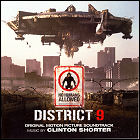 It’s almost easy to forget, now that we’ve been getting the pan-cultural ethnic musical stew of the recent remake of Battlestar Galactica for so many years, that SF movies were routinely being scored with ethnic percussion and instruments for quite some time before that – it was in vogue as Hollywood’s stand-in sound for “otherworldly”. But the score for District 9 actually has a reason to use African-inspired music: it actually takes place in Johannesburg and deals, at least allegorically, with apartheid. If anyone can get away with it, District 9 and its composer, Clinton Shorter, can.
It’s almost easy to forget, now that we’ve been getting the pan-cultural ethnic musical stew of the recent remake of Battlestar Galactica for so many years, that SF movies were routinely being scored with ethnic percussion and instruments for quite some time before that – it was in vogue as Hollywood’s stand-in sound for “otherworldly”. But the score for District 9 actually has a reason to use African-inspired music: it actually takes place in Johannesburg and deals, at least allegorically, with apartheid. If anyone can get away with it, District 9 and its composer, Clinton Shorter, can.
But the District 9 score isn’t exotic to the bone – underneath it all is an orchestral base, usually rumbling in the lower registers and filling out the bottom end of the mix with slightly more traditional musical portrayals of the darkness running through the story. (And it must be said that it’s pretty dark, but for more on that, check out theLogBook.com’s Movie Reviews.)
I don’t want to dismiss the more contemplative moments of either the movie or its music, but the real highlights are where the ethnic percussion and traditional orchestral backing meld together: tracks like “Exosuit” and “A Lot Of Secrets” show this combination off to best effect. The quieter moments are nice too, but Shorter really shines in the movie’s action scenes. Fortunately, much of the soundtrack draws from the latter 2/3 of the movie; the beginning of the film leans heavily on a documentary “fly on the wall” style and, aside from the opening titles (which are presented on the CD) is a bit light on music. Because of that unusual balance of where/when the music falls in the movie, you can rest assured that most of the cues you remember in the latter half of the movie are present here too.
 The music from District 9 may not be the most breathtakingly original melding of western and non-western music for a film score, but it’s an enjoyable one, and it services a story that actually pays off its more exotic elements. It’s an interesting listen away from the movie’s visuals, especially if you’re in the mood for dark, thundering percussion.
The music from District 9 may not be the most breathtakingly original melding of western and non-western music for a film score, but it’s an enjoyable one, and it services a story that actually pays off its more exotic elements. It’s an interesting listen away from the movie’s visuals, especially if you’re in the mood for dark, thundering percussion.
- District 9 (6:30)
- I Want That Arm (2:14)
- She Calls (1:36)
- Exosuit (3:17)
- Harvesting Material (1:47)
- Heading Home (1:16)
- A Lot Of Secrets (2:29)
- Back To D9 (1:47)
- Wikus Is Still Running (2:58)
- Get Him Talking (2:07)
- Prawnkus (4:01)
Released by: Sony
Release date: 2009
Total running time: 30:02
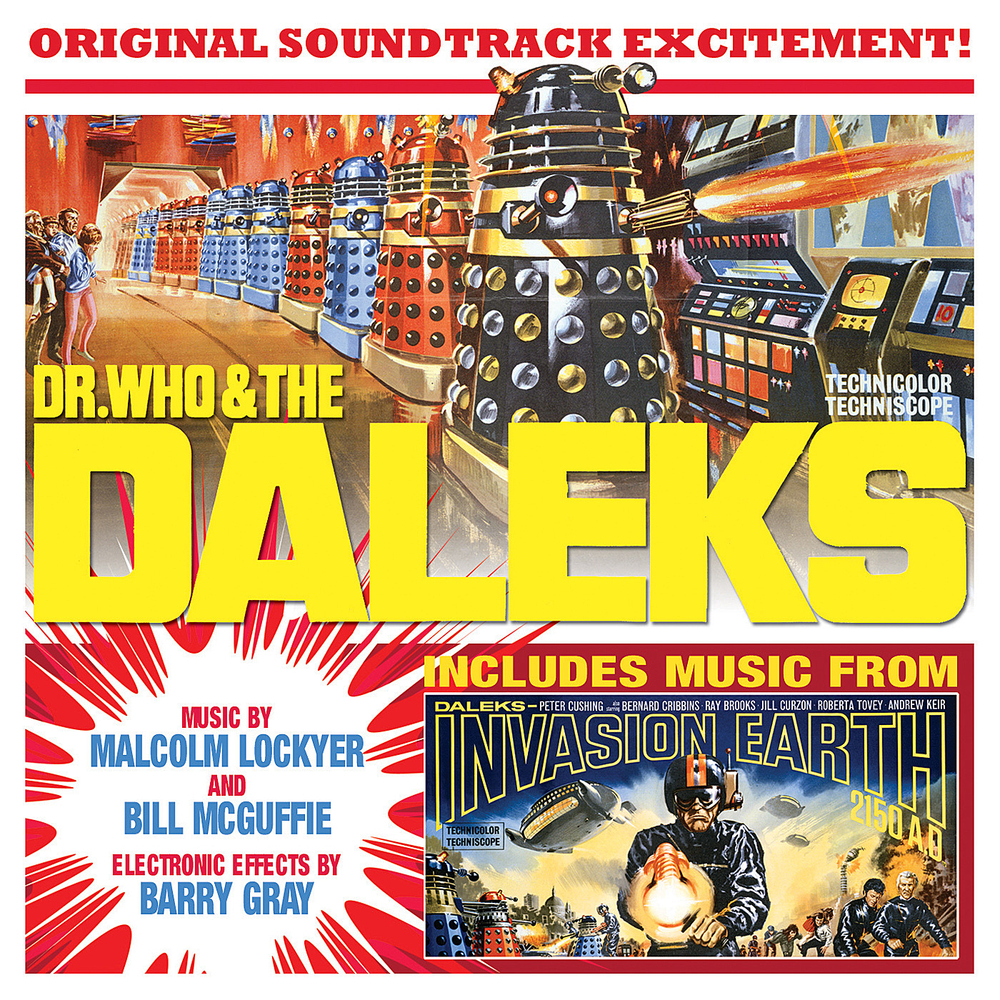
Dr. Who & The Daleks / Daleks: Invasion Earth 2150 A.D.
 Long before Murray Gold drenched the adventures of the TARDIS with lavish orchestral arrangements, and even long before John Debney et al. did the same with synthesized orchestral bombast, there were tales of the Doctor and the Daleks that were accompanied by unabashed, full-bodied symphonic splendor – only the Doctor wasn’t David Tennant then. The Doctor wasn’t even really the Doctor. Doctor Who was played by none other than Peter Cushing, and the Daleks graced the big screen in full color. The latest – and perhaps least-likely-to-ever-exist – Doctor Who soundtrack on the shelves brings together music from Cushing’s oft-derided pair of outings in the TARDIS, Doctor Who & The Daleks (1965) and Daleks: Invasion Earth 2150 A.D. (1966).
Long before Murray Gold drenched the adventures of the TARDIS with lavish orchestral arrangements, and even long before John Debney et al. did the same with synthesized orchestral bombast, there were tales of the Doctor and the Daleks that were accompanied by unabashed, full-bodied symphonic splendor – only the Doctor wasn’t David Tennant then. The Doctor wasn’t even really the Doctor. Doctor Who was played by none other than Peter Cushing, and the Daleks graced the big screen in full color. The latest – and perhaps least-likely-to-ever-exist – Doctor Who soundtrack on the shelves brings together music from Cushing’s oft-derided pair of outings in the TARDIS, Doctor Who & The Daleks (1965) and Daleks: Invasion Earth 2150 A.D. (1966).
It’s an unlikely release because we’re talking about music from a pair of 40+ year old movies which are generally considered irrelevant by Doctor Who fan canon-keepers. There’s just no way to slot the Cushing movies into the TV series continuity, and between that and the movies’ off-the-scale campiness, the two films tends to be disregarded, perhaps a bit unfairly: even recent Doctor Who has displayed elements influenced by the movies (not the least of which is the beefed-up look for the Daleks themselves). Just as there’s no story continuity with the TV series, there’s also no musical continuity: the two films’ scores sound nothing like anything that had been heard on TV Doctor Who up to that point. Ron Grainer’s immortal TV theme music isn’t even hinted at. Malcolm Lockyer graces Doctor Who & The Daleks with a hypnotic, languid mysterioso theme with an incredibly long melody line. Most of that movie’s score, which takes up the majority of this album, is built around two or three motifs, with the result being that quite a few cues sound similar to one another.
Made a year apart, the two movies don’t even share musical continuity with each other, never mind wishing for any nods to the TV theme. Bill McGuffie takes over the composing duties for Daleks: Invasion Earth 2150 A.D. and gives that movie’s music a completely different sensibility – generally darker and more aggressive, and yet in some scenes the music plays up farcical comedy. There’s one other issue with the Invasion Earth tracks: they’re drenched in sound effects from the movie. Classic Who remixing and sound restoration maestro Mark Ayres has said that he’s been unable to locate anything but the “music + FX” tracks from the movie; this odd sound mix was kept by the studio so foreign actors could dub the dialogue in their own language, while preserving the rest of the sound mix. As such, the music is interrupted by explosions, spaceship take-offs, breaking glass, and so on – it’s very distracting…but perhaps better than having nothing from that movie.
Things are rounded off by a selection of “related” tracks: vintage singles tied in to each movie, including upbeat “single” versions of the respective theme music. There are also sound effects from each film as well, including a TARDIS interior ambience that’s so typically “’50s/’60s B-movie sci-fi lab sound FX” that it’s nearly laughable; interior FX from the Dalek city are marginally more interesting.
The remastering job undertaken by Ayres for all of the music presented here is impressive, resulting in crisp, clean recordings, marred only occasionally by brass swells which sound like they were “overdriven” (i.e. too loud for the limitations of the recording gear) at the original sessions. Aside from just a few instances of that, it sounds pristine – it could’ve been recorded yesterday. And maybe that’s the best reason to pick up this album: as the first full-blooded orchestral Doctor Who music, it’s not a million miles away, frankly, from the unashamedly bold sounds used by Murray Gold today. Elements of the music act as sonic time stamps: James Bond-esque bass guitar (and equally John Barry-esque brass blasts), for example – but then, doesn’t the “Westminster Bridge” on the first modern-era Doctor Who soundtrack  CD have both of those sonic signatures too? But this was the first time that Doctor Who had been taken into an orchestral context, as opposed to electronic abstraction or the low-key small ensemble sounds of Dudley Simpson and his contemporaries. Perhaps it’s another way in which the two Peter Cushing Doctor Who movies have proven to be influential (if not downright prophetic).
CD have both of those sonic signatures too? But this was the first time that Doctor Who had been taken into an orchestral context, as opposed to electronic abstraction or the low-key small ensemble sounds of Dudley Simpson and his contemporaries. Perhaps it’s another way in which the two Peter Cushing Doctor Who movies have proven to be influential (if not downright prophetic).
Dr. Who & The Daleks – music by Malcolm Lockyer
- Fanfare and Opening Titles (1:48)
- TARDIS (0:48)
- The Petrified Jungle (1:58)
- The Petrified Creature and The City (0:52)
- Four Return to TARDIS (1:06)
- The Medicine Box and The Climb To The City (2:24)
- City Corridors (1:54)
- Captured By The Daleks (1:19)
- Susan Leaves The City (1:17)
- The Jungle At Night (2:13)
- Susan Returns To The City (1:12)
- Escape From The Cell (3:05)
- The Trap (3:44)
- The Swamp (2:37)
- The Mountain (2:34)
- The Cave (1:57)
- The Jump (0:54)
- The Thals Approach The City (1:40)
- The Countdown (2:39)
- The Countdown Stops (2:17)
- Finale and End Titles (1:12)
Daleks: Invasion Earth 2150 A.D. – music by Bill McGuffie
- Smash and Grab (1:43)
- TARDIS Departs (0:12)
- Opening Titles (1:59)
- TARDIS (1:15)
- London, 2150 A.D. (0:50)
- Daleks and Robomen (5:01)
- Message To Grandfather and The Dalek Saucer Takes Off (1:26)
- The Mine Workings and The Cottage (1:25)
- Preparing the Bomb Capsule (1:22)
- Smash and Grab (Reprise) and End Titles (2:09)
Bonus Tracks
- The Eccentric Doctor Who (2:25)
- Daleks and Thals (2:09)
- Fugue for Thought (2:17)
- Fanfare and Opening Titles (with effects) (1:48)
- TARDIS Effects (3:06)
- Dalek City Effects (6:31)
Released by: Silva Screen
Release date: 2009
Total running time: 75:08
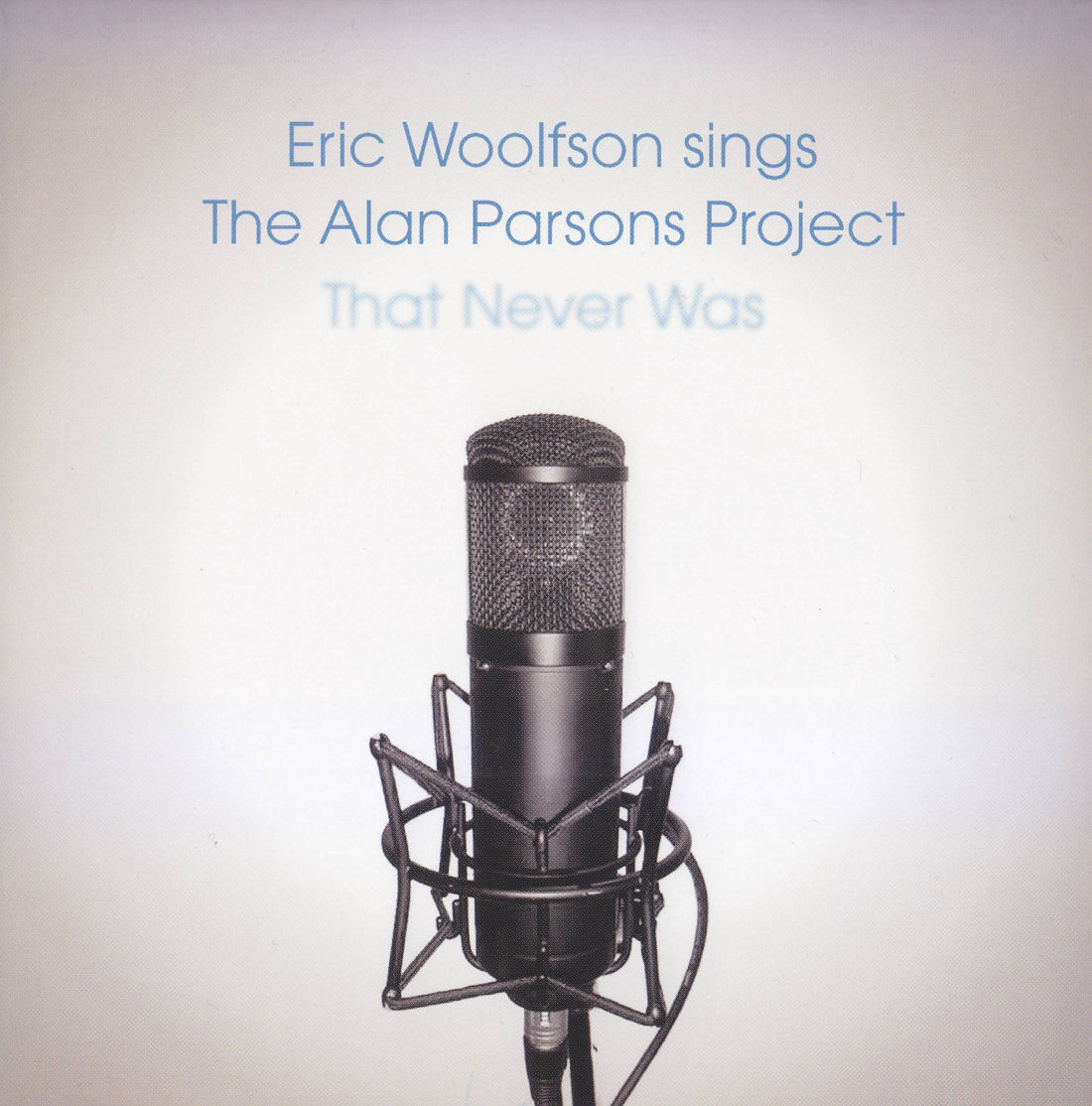
Eric Woolfson Sings The Alan Parsons Project That Never Was
 Let’s start out by pointing out one thing: the title of this album is a complete misnomer. There are, indeed, at least a couple of songs that were pitched as potential Alan Parsons Project numbers, but the bulk of Eric Woolfson Sings The Alan Parsons Project That Never Was is taken up by songs that were intended, from the start, to feature in Woolfson’s post-Project stage musicals. There’s nothing wrong with that – I’ve tried to follow Woolfson’s music as well as Parsons’ – but it just seems that this album’s title is more than just a little bit misleading. Perhaps it should be Eric Woolfson Boosts Sales By Mentioning His Past Association With The Alan Parsons Project.
Let’s start out by pointing out one thing: the title of this album is a complete misnomer. There are, indeed, at least a couple of songs that were pitched as potential Alan Parsons Project numbers, but the bulk of Eric Woolfson Sings The Alan Parsons Project That Never Was is taken up by songs that were intended, from the start, to feature in Woolfson’s post-Project stage musicals. There’s nothing wrong with that – I’ve tried to follow Woolfson’s music as well as Parsons’ – but it just seems that this album’s title is more than just a little bit misleading. Perhaps it should be Eric Woolfson Boosts Sales By Mentioning His Past Association With The Alan Parsons Project.
In a way, the album serves as a Woolfson “best of” collection, drawing from his numerous musical productions. The pieces heard here are not sung by the cast, however: these are demos or fresh recordings of the songs, arranged and sung by Woolfson himself. There are no repeats of known Project material here; if you’re new to Woolfson’s musicals, this material will be new to you. The only pieces I recognized were a couple of songs from his Poe concept album (which was more or less a commercially-released demo to prove the viability of the concept of a musical based on the life of Edgar Allan Poe), but they appear here in very different forms.
Listeners who soaked up the series of remastered Project albums will find two familiar pieces of music here: Rumour Going Round, previously presented as a mostly-instrumental backing track with a very incomplete rough vocal, is fleshed out with full vocals here (though the very 1985 backing track makes it a bit of a novelty by default). And if fans need a further stamp of Parsons Project authenticity, longtime Project guitarist Ian Bairnson lays down some brand new riffs on “Any Other Day”, the album’s only other bona fide Project song that never was.
But there’s plenty more for Woolfson’s longtime fans to enjoy. “Golden Key”, the lead track, bears more than a passing resemblance to 1983’s minor Project hit “Don’t Answer Me”. One of the best songs on the album, “I Can See Round Corners”, is an ethereal song with some haunting multitracked harmonies. “Nothing Can Change My Mind”, heard originally on Poe, is perfectly suited to Woolfson’s vocal range and his unique delivery. One of the most intriguing demos is a rootsier, raw rock version of Poe‘s “Train To Freedom”, here titled “Train To Wuxi” (after the Chinese tin-mining city Woolfson was visiting when he wrote the song); not only does the song have an unusually stripped-down sound, but Woolfson himself plays a decent guitar riff throughout.
The title may be a bit of a misdirection, but the music here is still solid. I’d really like to hear Woolfson cook up another album like Poe, but along the lines of classic Project concept albums  like I Robot and The Turn Of A Friendly Card. With this album, he’s demonstrated that he has musical colleagues he can call upon to instrumentally make up for the other half of the Project. It may never be the production piece that it would be with Parsons aboard, but I’d like to hear some more original music from Woolfson. This album shows he could do it.
like I Robot and The Turn Of A Friendly Card. With this album, he’s demonstrated that he has musical colleagues he can call upon to instrumentally make up for the other half of the Project. It may never be the production piece that it would be with Parsons aboard, but I’d like to hear some more original music from Woolfson. This album shows he could do it.
- Golden Key (4:12)
- Nothing Can Change My Mind (4:00)
- Rumour Goin’ Round (4:39)
- Any Other Day (3:08)
- I Can See Round Corners (5:15)
- Steal Your Heart Away (3:20)
- Along The Road Together (3:21)
- Somewhere In The Audience (4:36)
- Train To Wuxi (4:19)
- Immortal (6:02)
Released by: Limelight Records
Release date: 2009
Total running time:

Airplane! – music by Elmer Bernstein
 In 1980, the majority of the movie-viewing public that had missed Kentucky Fried Movie got to know the Zucker-Abrahams-Zucker production team by way of their big-budget, big-screen debut, Airplane!. Like ZAZ’s later (criminally short-lived) TV spoof Police Squad!, Airplane! had the virtue of starring Leslie Nielsen, whose businesslike demeanor and unshakeable poker-faced deadpan sells the whole endeavour.
In 1980, the majority of the movie-viewing public that had missed Kentucky Fried Movie got to know the Zucker-Abrahams-Zucker production team by way of their big-budget, big-screen debut, Airplane!. Like ZAZ’s later (criminally short-lived) TV spoof Police Squad!, Airplane! had the virtue of starring Leslie Nielsen, whose businesslike demeanor and unshakeable poker-faced deadpan sells the whole endeavour.
And then there’s an absolutely brilliant score by the late, great Elmer Bernstein, which alternates between being just as straight-faced dramatic as Nielsen, and delivering musical punchlines unashamedly. It’s hard to overemphasize how important Bernstein’s music is to Airplane! – it straddles the fine line between truly dramatic music and schmaltzy cheese, and more to the point, Bernstein seemed to have an unerring instinct for which extreme was needed in a given scene. Many cues on the long-overdue soundtrack release could come from just about any big-screen drama, but occasionally, the music gets away with the kind of clowning that the directors told the cast to carefully avoid.
A prime example of this is the love theme – it’s a nice enough piece of music, but it’s arranged almost like elevator music; any true passion inherent in the tune itself gets wrapped up in a gooey layer of cheese. Later in the movie, as the tension picks up, the music does things that would be unthinkable in a straightforward dramatic context, building up the melodrama and then coming to a dead stop to let the cast get a punchline in. But the beauty of it is that it’s all so deadly serious-sounding until those moments arrive.
How this translates to a listening experience sans dialogue is largely down to how much of an Airplane! fan you are. I’ve loved this movie since I was about 10 years old, so yeah, I love the soundtrack. I only have one real complaint with the score. What is it? (It’s the music in a movie that the audience can hear but the characters can’t, but that’s not important right now.*) My only beef is that I had to wait this long to get it (between this score’s overdue release and the recent complete-score release of Star Trek II: The Wrath Of Khan, there’s clearly been a sea change at  Paramount’s music department regarding exploitation of the back catalogue). I’d never before given serious thought to the possibility of an Airplane! score album…but I’m glad that someone at La-La Land did. It’s a great listening experience altogether.
Paramount’s music department regarding exploitation of the back catalogue). I’d never before given serious thought to the possibility of an Airplane! score album…but I’m glad that someone at La-La Land did. It’s a great listening experience altogether.
* Strictly speaking, this CD also contains source cues as well – i.e. music that the characters do hear, including folk songs that are worth having your IV tube yanked out.
- Main Title (contains theme from Jaws) (1:53)
- Kiss Off (0:48)
- Ambulance Arrives (0:32)
- Hari Krishna / Ticket / Nervous (2:44)
- Lisa / Farewell / Take Off / Another Meeting (3:17)
- Fighting Girls (0:47)
- Love Theme From Airplane! (1:07)
- From Here To There (2:08)
- Head / Memory (1:13)
- Shimmer / Molumbo (1:02)
- Zip / Eggs / Roger, Take Over (2:34)
- Wild Violins / Sickness / Idea (2:25)
- Thar She Blows / Flash / Panel (2:23)
- “Where The Hell Is Rex Kramer?” / Trouble (1:02)
- Mayday (0:56)
- Punch-Up / Kramer (1:14)
- Clumsy (0:55)
- Dog Fight / Failure / Pep Talk / Victory March (3:45)
- News (0:56)
- “Runway Is Niner” / “The Gear Is Down And We’re Ready To Land” (1:03)
- Crasher (4:02)
- Resolution / Tag (1:52)
- Notre Dame Victory March (2:01)
- Tavern (0:35)
- Everything’s Coming Up Roses (0:20)
- Instruments (0:13)
- Disco (0:30)
- Kiss Off (Alternate) (0:47)
- Fighting Girls (Alternate) (0:44)
- From Here To There (Instrumental) (2:08)
- Molumbo (Alternate) (0:52)
- Zip (Original Version) (0:31)
- News (Alternates) (1:48)
- Dog Fight (Alternate) (0:37)
- “Runway Is Niner” (Alternate) (0:30)
- “The Gear Is Down And We’re Ready To Land” (Alternate) (0:30)
- Tag (Instrumental) (1:44)
Released by: La-La Land Records
Release date: 2009
Total running time: 52:28
Liam Finn + Eliza Jane – Champagne In Seashells
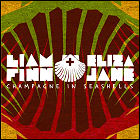 An EP to keep his fans satisfied after his successful (to say the least) indie debut, Champagne In Seashells isn’t so much a continuation of I’ll Be Lightning as it is a continuation of Finn’s celebrated live show, in which he uses multiple looping effects pedals and multiple instruments to perform stunning feats of live multitracking, building his grooves up right before his delighted audiences’ eyes. Along for the ride this time is E.J. Barnes, who’s been integral to his live show for some time now.
An EP to keep his fans satisfied after his successful (to say the least) indie debut, Champagne In Seashells isn’t so much a continuation of I’ll Be Lightning as it is a continuation of Finn’s celebrated live show, in which he uses multiple looping effects pedals and multiple instruments to perform stunning feats of live multitracking, building his grooves up right before his delighted audiences’ eyes. Along for the ride this time is E.J. Barnes, who’s been integral to his live show for some time now.
With only five songs, you probably wouldn’t expect dizzying experimental heights from Champagne In Seashells – but it manages to deliver them anyway. The highlights of this quintet are the distinctly ’80s-flavored “Long Way To Go”, and the final track, “On Your Side”, with Barnes’ beguiling lead vocals lending a whole new feel to Finn’s experimental palette of sounds. I don’t know if the two are  planning on forging ahead as a double act, but with songs like, that, it certainly can’t hurt to consider it.
planning on forging ahead as a double act, but with songs like, that, it certainly can’t hurt to consider it.
“Won’t Change My Mind” also reminds us that Liam Finn has stepped out from the not-inconsiderable shadow of his musical dad and uncle not because of studio trickery, but because he’s a gifted songwriter and performer in his own right – really, the whole EP is a testament to that, and as such comes highly recommended.
- Plane Crash (3:43)
- Long Way To Go (2:45)
- Won’t Change My Mind (6:34)
- Honest Face (3:42)
- On Your Side (3:02)
Released by: Yep Roc
Release date: 2009
Total running time: 19:46
8 Bit Weapon – Electric High
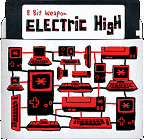 Another group that I file under “doesn’t release new material as often as I’d like,” veteran chiptune pioneers 8 Bit Weapon are back, now pared down to a duo, with some incredibly catchy new tunes. The opening volley, “Closer (Bitpop Mix)”, is an infectiously catchy song with the welcome return of a female vocal. While still heavily processed (a la vocoder epics like “One Last Mission” and “Micro Boogie”), it’s an interesting sound and one that, surprisingly, is a stand-alone here; it’s not as if 8 Bit Weapon’s instrumentals are suddenly chopped liver, but I wish they’d sing some more. When I look back at the group’s post-Confidential output, the songs that stick out as my favorites are the ones with vocals. 8 Bit Weapon has a gift for catchy tunes and their instrumentation gives them a unique sound by default; their vocal offerings, more often than not, have clever lyrics and just a little extra something that turns a good instrumental into a great, addictive, fleshed-out song. With only six songs on the Electric High EP, it would’ve been nice to have two, even three songs with vocals. I’d love for 8 Bit Weapon to bring the vocal-to-instrumental ratio to parity.
Another group that I file under “doesn’t release new material as often as I’d like,” veteran chiptune pioneers 8 Bit Weapon are back, now pared down to a duo, with some incredibly catchy new tunes. The opening volley, “Closer (Bitpop Mix)”, is an infectiously catchy song with the welcome return of a female vocal. While still heavily processed (a la vocoder epics like “One Last Mission” and “Micro Boogie”), it’s an interesting sound and one that, surprisingly, is a stand-alone here; it’s not as if 8 Bit Weapon’s instrumentals are suddenly chopped liver, but I wish they’d sing some more. When I look back at the group’s post-Confidential output, the songs that stick out as my favorites are the ones with vocals. 8 Bit Weapon has a gift for catchy tunes and their instrumentation gives them a unique sound by default; their vocal offerings, more often than not, have clever lyrics and just a little extra something that turns a good instrumental into a great, addictive, fleshed-out song. With only six songs on the Electric High EP, it would’ve been nice to have two, even three songs with vocals. I’d love for 8 Bit Weapon to bring the vocal-to-instrumental ratio to parity.
Not that the instrumentals are anything to complain about here; “Kiss My Bits (ComputeHer Mashup Mix)” and “Macro Disko (Minimal Mix)” are early favorites. “Chiptune Attack 2600 A.D.” features a rare foray into the nearly-atonal sounds generated by an Atari 2600, and yet still manages to be a catchy – if quirky – tune. All of the tracks on Electric High are worth a listen, and at only six tracks, there’s no filler material – the EP makes a strong statement and doesn’t outstay its welcome.
8 Bit Weapon has a unique, fun sound – so much so that Sony’s production music department singled them out to build an effects and instrument library so that anyone with Nuendo, Cubase or other sequencing software can start cranking out chiptunes. (That, in and of itself, could be a great thing, or it could lead to a flood of dreck – part of the compelling appeal of chiptunes artists is that they are, in fact, using this old computer and game hardware to make these sounds. Sequencing and sampling one’s way to a new chiptune opus  almost seems like cheating. Of course, there’s probably some string quartet out there staring me down for all those string samples I mess around with in Cubase, so it’s all down to your point of view.) They’re still on top of their game (literally!) with Electric High – I just wish they’d belt out some words more often. (Seriously, guys, if you need help with lyrics, if that’d get some more songs with vocals out there, just call me.)
almost seems like cheating. Of course, there’s probably some string quartet out there staring me down for all those string samples I mess around with in Cubase, so it’s all down to your point of view.) They’re still on top of their game (literally!) with Electric High – I just wish they’d belt out some words more often. (Seriously, guys, if you need help with lyrics, if that’d get some more songs with vocals out there, just call me.)
- Closer (Bitpop Mix) (2:52)
- Kiss My Bits (Computeher Mashup Mix) (2:05)
- Chip On Your Shoulder (3:24)
- FUNDanalogue (2:22)
- Chiptune Attack 2600 AD (3:16)
- Macro Disko (Minimal Mix) (3:38)
Released by: 8 Bit Weapon
Release date: 2009
Total running time: 17:37
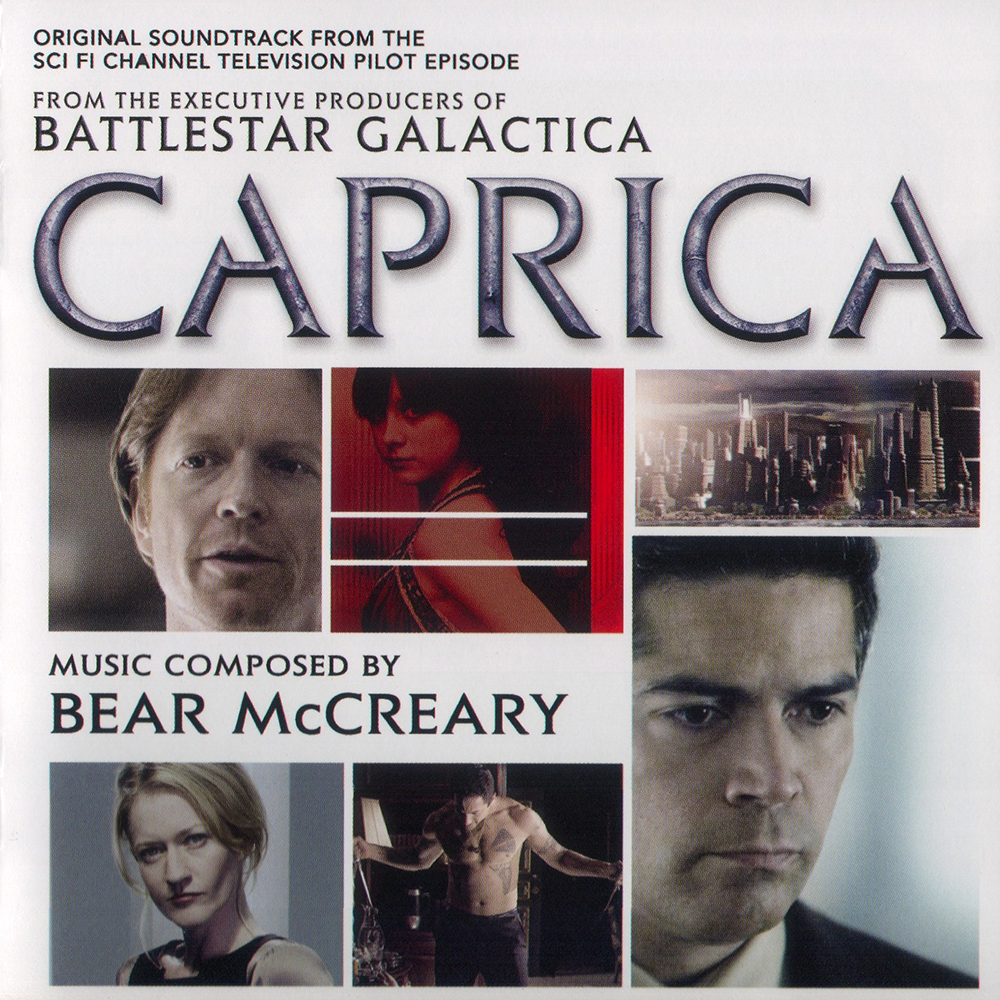
Caprica – music by Bear McCreary
 I’m reviewing this slightly out of order, as it was released a few months before the Battlestar Galactica Season 4 soundtrack (which runs a damn good chance of being the best film music release, by anyone, in any medium, anywhere this year), and indeed I listened to Caprica before the Galactica soundtrack arrived. I held back on a review to see if a closer listen to both at the same time would reveal more connecting tissue, musically speaking, than there appears to be at first.
I’m reviewing this slightly out of order, as it was released a few months before the Battlestar Galactica Season 4 soundtrack (which runs a damn good chance of being the best film music release, by anyone, in any medium, anywhere this year), and indeed I listened to Caprica before the Galactica soundtrack arrived. I held back on a review to see if a closer listen to both at the same time would reveal more connecting tissue, musically speaking, than there appears to be at first.
On reflection, though, I’m not sure why I’d expect there to be; Capirca isn’t Galactica. It’s a landlubber show as opposed to its spacefaring forebear, serving as a prequel to Galactica, with its events taking place over half a century before the destruction of the twelve colonies. Musically, it’s more traditional than Galactica; as the show takes place in a society that’s modeled somewhat on post-WWII America (except that there are maglev trains and interplanetary travel, and racial and political tensions to go with them), the music is in a minimalist orchestral vein. The exotic instrumentation of Galactica is replaced with a more traditional string ensemble here.
That’s not to say that there aren’t hints of Galactica here and there; a few tracks in particular jump out as being the very connecting tissue I was looking for. Galactica’s wall-of-percussion sound returns for three key scenes: “Terrorism On The Lev”, “Zoe Awakens” and “Cybernetic Life Form Node”. All three of these cues accompany pivotal moments that are just the beginning of putting Caprica on the road to hell, and two of them involve the very first Cylon.
There’s a subtler reference back to Galactica with the instrumentation of “Monotheism At The Athena Academy”, hinting at the “ancient” Mediterranean sound of Caprica’s predecessor, and an overt reference in “The Adama Name”, which is a warm, string-based rendition of “Wander My Friends”, a song from Galactica’s first season which became the theme for Bill Adama (not coincidentally, this music accompanies virtually the only major scene in Caprica’s pilot movie for Adama, who’s still a child at this point).
Much – if not most – of the rest of the score revolves around variations on “The Graystone Family”, the first thing you hear on the CD. And indeed that family’s story is absolutely vital to Caprica, but the funereal tone of the soundtrack here makes it all seem to blur together at times. I’m reluctant to pass judgement on the Caprica soundtrack because it is just the pilot – think about how much bearing the soundtrack from the 2003 Battlestar Galactica miniseries has on, say, the music from the series finale. (And at the same time, if that same downer “feel” pervades the show and not just the music, I might pass on Caprica altogether.)
 The booklet accompanying the CD gives the impression that Galactica house composer Bear McCreary wasn’t necessarily considered a shoo-in for the job on Caprica. But at the same time, there’s no reason for him to not have automatically gotten the job; in the end, Battlestar Galactica’s music was one of the best things about the show, and as the story got murkier and more depressing, the music was honestly one of the few things that kept me around at times. If the tone of the pilot movie is any indication, Caprica’s going to need him too.
The booklet accompanying the CD gives the impression that Galactica house composer Bear McCreary wasn’t necessarily considered a shoo-in for the job on Caprica. But at the same time, there’s no reason for him to not have automatically gotten the job; in the end, Battlestar Galactica’s music was one of the best things about the show, and as the story got murkier and more depressing, the music was honestly one of the few things that kept me around at times. If the tone of the pilot movie is any indication, Caprica’s going to need him too.
- The Graystone Family (3:02)
- Terrorism On The Lev (3:15)
- Grieving (3:46)
- Lacey and Zoe-A (4:08)
- Cybernetic Life Form Node (3:16)
- Zoe’s Avatar (3:04)
- Daniel Captures The Code (2:29)
- A Tauron Sacrifice (2:46)
- Amanda Graystone (3:05)
- Joseph and Daniel (4:18)
- Tamara’s Heartbeat (1:42)
- Delivering The Message (2:56)
- Monotheism At The Athena Academy (3:34)
- Children Of Caprica (2:30)
- Irrecoverable Error (2:47)
- The Adama Name (1:39)
- Zoe Awakens (2:22)
- Caprica End Credits (3:38)
Released by: La-La Land Records
Release date: 2009
Total running time: 54:17
Tripods: The Pool Of Fire Suite – music by Ken Freeman
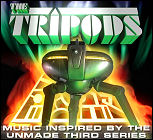 Included as a bonus feature of the long-delayed (and long, long overdue) compelte series DVD set of the 1980s BBC SF series The Tripods, and also available as a download for those with no interest in the DVDs, the Pool Of Fire Suite is an interesting experiment: original Tripods TV composer Ken Freeman, a master of synthetic textures, composed new music for key story points in the season of the show that was never made. Despite the fact that over 20 years have passed, Freeman makes an effort to make it sound as though this music is coming out of his synth rig circa 1986/87 – with minimal hints of the massive advances that have been made in synthesizers and/or sampling in the intervening two decades.
Included as a bonus feature of the long-delayed (and long, long overdue) compelte series DVD set of the 1980s BBC SF series The Tripods, and also available as a download for those with no interest in the DVDs, the Pool Of Fire Suite is an interesting experiment: original Tripods TV composer Ken Freeman, a master of synthetic textures, composed new music for key story points in the season of the show that was never made. Despite the fact that over 20 years have passed, Freeman makes an effort to make it sound as though this music is coming out of his synth rig circa 1986/87 – with minimal hints of the massive advances that have been made in synthesizers and/or sampling in the intervening two decades.
“A Plan Of Action” immediately sets the tone with an extended, minor-key statement of the Tripods theme, but this time slowed down to a dirge: it’s easy to imagine this music covering the scenes picking up from the second season’s cliffhanger, in which Will and his friends discover that the base from which their resistance movement has been fighting the Earth-dominating Tripods has been laid to waste. As easy as it is to picture these things, Freeman is free to explore the material without the timing constraints of composing to picture.
Freeman delves into a surprisingly bluesy, guitar-centered sound with a percolating ’80s-style synth backing in “A Drink With Ruki”, an a similarly upbeat brass riff lightens things up in “The Pool Of Fire” itself. “Summer Wind” also keeps things light for a portion of the story involving the view from a hot air balloon.
After the triumphant strains of “Freedom”, “The Conference Of Man” brings the Tripods theme back to the fore, this time in a much more confident (and less mournful) interpretation, but there’s still dissonant unease waiting in the wings: without the Tripods to unit humanity in a fight against a common cause, the newly freed human race risks splintering into factions fighting over its own resources. Where this storyline could have gone is anyone’s guess: there were no further books carrying the story forward, and of course there were no further TV adventures. So we’re still treated to an unresolved cliffhanger – albeit a purely musical one.
 I’ve always been a huge fan of the original Tripods music, so the very notion that the BBC would commission Ken Freeman to provide music for adventures never filmed is a huge hit with me. The music is sensational – and I’m sure I’m not the only one thinking that it’s the BBC’s (and the audience’s) loss that a third season wasn’t made that could have featured music like this.
I’ve always been a huge fan of the original Tripods music, so the very notion that the BBC would commission Ken Freeman to provide music for adventures never filmed is a huge hit with me. The music is sensational – and I’m sure I’m not the only one thinking that it’s the BBC’s (and the audience’s) loss that a third season wasn’t made that could have featured music like this.
- A Plan Of Action (3:46)
- The Green Man (6:40)
- A Drink With Ruki (7:32)
- The Pool Of Fire (6:31)
- Summer Wind (4:40)
- Freedom (5:30)
- The Conference Of Man (5:33)
Released by: BBC Video (as part of The Tripods: The Complete Series DVD box set)
Release date: 2009
Total running time: 40:12
Regina Spektor – Far
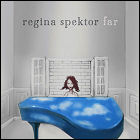 This is going to sound like a completely goofy reason to go and buy an album, but I went to get Regina Spektor’s Far purely because of one of the producers she worked with on the album. Seriously. Now, when you take into account that the producer in question is the reclusive former ELO mastermind Jeff Lynne, it makes a bit more sense – not only am I a lifelong fan of his, but any appearance by him on record is a rare and precious thing indeed.
This is going to sound like a completely goofy reason to go and buy an album, but I went to get Regina Spektor’s Far purely because of one of the producers she worked with on the album. Seriously. Now, when you take into account that the producer in question is the reclusive former ELO mastermind Jeff Lynne, it makes a bit more sense – not only am I a lifelong fan of his, but any appearance by him on record is a rare and precious thing indeed.
That said, Far is, in places, a much better album than I expected, regardless of who’s manning the mixing console on a given track. My first exposure to Regina Spektor was – perhaps unfortunately – her duet with Ben Folds, “You Don’t Know Me”, from Folds’ last studio album. I thought she had a fairly distinctive voice, enough that I was intrigued, but when I went to Amazon to check out clips of her solo work, her back catalog just didn’t register as being “my thing”. Where Far succeeds, it succeeds spectacularly, and where it misfires, it does so equally spectacularly.
If I have a problem, stylistically speaking, with Ms. Spektor, it’s with her tendency to try to be a bit too “cute” both lyrically and in her vocal delivery, with a habit of over-enunciating words for effect. Once in a while, it’s okay, but it seems like every third song shows that tendency, which is a pity, because it distracts from the sheer beauty of some of the songs where she isn’t trying to hard to be clever. It’s jarring to veer from “Human Of The Year” or “The Genius Next Door” to something like “Dance Anthem Of The ’80s”, which literally revolves around her funny-pronunciation gimmick.
Where she does a straightforward delivery, Spektor’s work is just breathtaking – “The Calculation”, “Blue Lips” and “Laughing With” are repeat listening favorites. Where she only does a little bit of gimmicky delivery, such as “Machine” or “Folding Chair”, it doesn’t distract from her outstanding songwriting. These songs display a great command of crafting a song and, in places, surprisingly mature lyrics.
Where she loses me is with the stacatto, machine-gun syllables of
“Dance Anthem Of The 80s”; which really epitomizes the facet of Far that I greatly dislike, with lines like “You-oo-oo-oo-oo are-are-are so swee-ee-ee-ee-eet”…it’s like listening to a singing Dalek. I don’t mind a bit of musical comedy here and there, but when it becomes grating to listen to, I draw the line. There are a couple of “skippers” on Far – i.e. songs I quickly decided I could do without after the first couple of listens. Maybe there’s something I’m missing from not having seen her live, but the appeal of these songs evades me – it’s a true love/hate relationship.
Fortunately, Far has far more great songs than it does annoying novelty tunes, and on that merit I can recommend it. As for the Jeff Lynne-produced material, “Folding Chair” is one of the catchiest, most addictive songs I’ve heard all year (and Spektor’s humorous delivery actually works here as she delivers a short passage of the music in vocal “dolphin barks”). “Genius Of The Year” and “Wallet” are unusually stripped-down productions for Lynne, where “Blue Lips” is almost a little too Lynne-y. The download bonus track “The Sword & The Pen” is a bit jarring, with its sudden  dramatic build-ups to the chorus. Still, it’s good to hear the man’s doing something other than endlessly covering “Mr. Blue Sky”. (Spektor was apparently compeltely unaware of Lynne’s ELO pedigree, knowing his work only via Tom Petty’s Highway Companion!)
dramatic build-ups to the chorus. Still, it’s good to hear the man’s doing something other than endlessly covering “Mr. Blue Sky”. (Spektor was apparently compeltely unaware of Lynne’s ELO pedigree, knowing his work only via Tom Petty’s Highway Companion!)
With repeat listening, though, I really stopped caring who was producing what and just found myself enjoying the album – with a few exceptions.
- The Calculation (3:09)
- Eet (3:49)
- Blue Lips (3:32)
- Folding Chair (3:35)
- Machine (3:52)
- Laughing With (3:13)
- Human Of The Year (4:05)
- Two Birds (3:15)
- Dance Anthem Of The 80s (3:43)
- Genius Next Door (5:04)
- Wallet (2:26)
- One More Time With Feeling (3:56)
- Man Of A Thousand Faces (3:07)
- Time Is All Around (3:05)
- The Sword & The Pen (3:46)
Released by: Sire
Release date: 2009
Total running time: 53:39
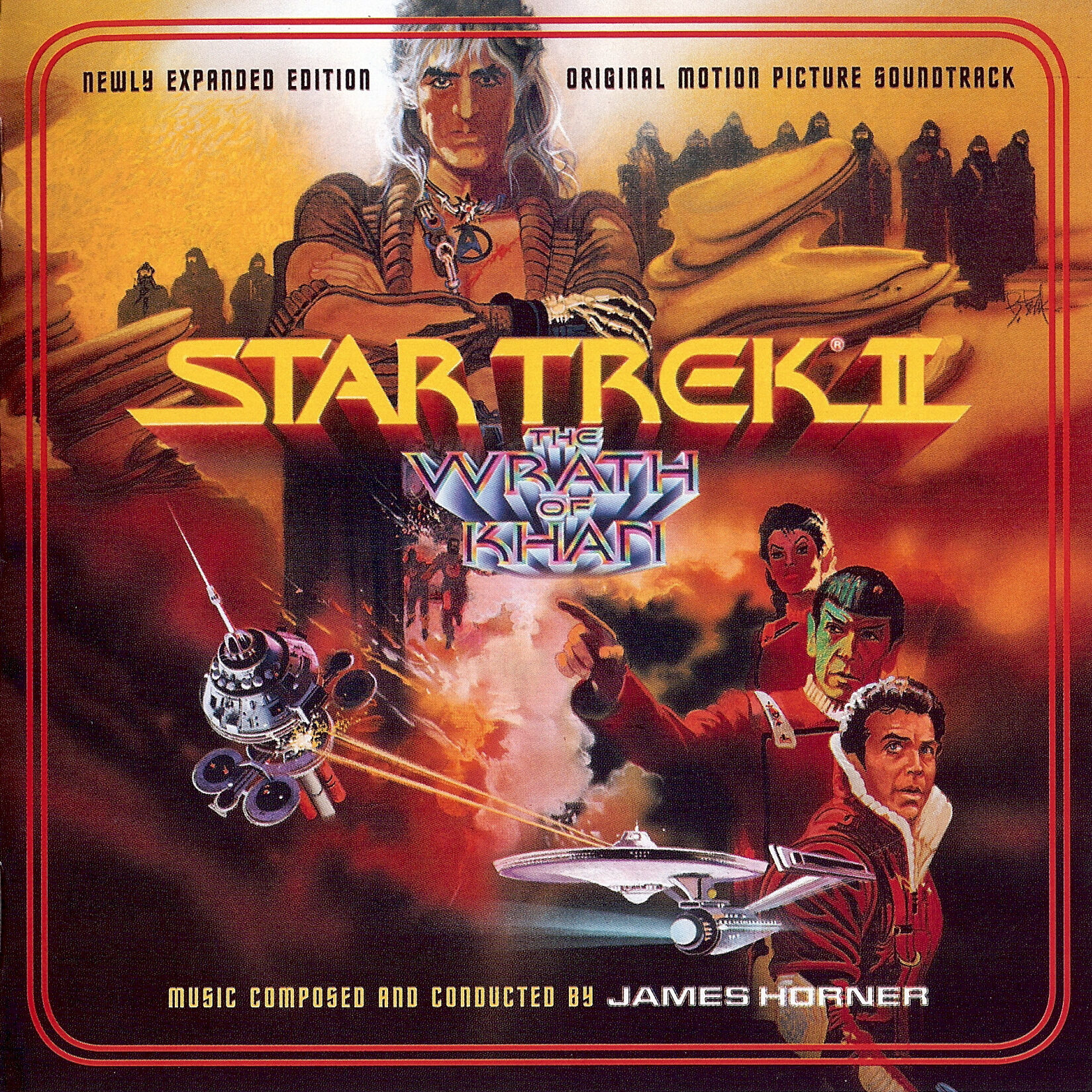
Star Trek II: The Wrath Of Khan (Newly Expanded Edition) – music by James Horner
Maybe we should’ve expected a release like this in a year in which the Star Trek franchise is suddenly coasting along on both warp power and the goodwill of a receptive public thanks to its big-screen relaunch, but this CD’s release caught me completely by surprise, and I hope it’s a sign of things to come.
Simply put, this CD gathers the complete score of James Horner’s celebrated, career-making music score from the second Star Trek film, in order, every note – even including material that was jettisoned after a studio-mandated reshoot required Horner to re-convene his orchestra and add more music at a late date. The soundtrack from Star Trek II has been released before, but this definitive remastered edition adds half an hour of music and represents every note heard in the course of the film. Add to that the usual lavish, well-researched booklet from Film Score Monthly, and you get a package worthy of one of the best scores in the franchise’s big-screen history.
Key passages of music that haven’t been heard before include – believe it or not – major movements in the movie’s climactic space battle, atmospheric tracks from early in the movie, and a brief piece of music that should be forever famous if for not other reason than underscoring William Shatner screaming “KHAAAAAAAAAAN!” Oh, and the death and funeral of one Mr. Spock. In short, the previously omitted tracks are not minor moments in the movie, and why they were left out on the original release is probably down to the fact that, in the LP-dominated days of the early 1980s, a 45-minute soundtrack album was considered more than enough unless, maybe, the movie’s title had “Wars” (rather than “Trek”) after “Star”. Even with that limitation in mind, some of the omissions from the original release are mind-boggling. This CD handily corrects that, and the improvement in sound quality is quite noticeable.
The booklet itself is worth the price of admission too: virtually everything you could possibly want to know about the movie’s music and its composer (including how he got the job and who else almost got the job) is here, lavishly illustrated, painstakingly researched, and the photos even reveal something I had never known about this movie: its composer can be seen in Starfleet uniform in a blink-and-you’ll-miss-it walk-on part.
I’m literally praying to God (who may or may not need a starship) that Film Score Monthly isn’t going to be content to leave the Star Trek franchise alone after this release. The third through eighth films cry out for more fully fleshed-out soundtrack releases like this, and I  wouldn’t kick FSM out of bed if they wanted to do something crazy like venture into unreleased music from The Next Generation or Deep Space Nine. A pipe dream? Maybe. But until FSM announced it, the expanded Star Trek II score seemed just as unlikely. It’s been worth the wait – great music finally getting a fitting treatment.
wouldn’t kick FSM out of bed if they wanted to do something crazy like venture into unreleased music from The Next Generation or Deep Space Nine. A pipe dream? Maybe. But until FSM announced it, the expanded Star Trek II score seemed just as unlikely. It’s been worth the wait – great music finally getting a fitting treatment.
- Main Title (3:08)
- Surprise On Ceti Aplha V (0:46)
- Khan’s Pets (4:20)
- The Eels Of Ceti Alpha V / Kirk In Space Shuttle (3:54)
- Enterprise Clears Moorings (3:34)
- Chekov Lies (0:42)
- Spock (1:13)
- Kirk Takes Command / He Tasks Me (2:08)
- Genesis Project composed & performed by Craig Huxley (3:17)
- Surprise Attack (5:08)
- Kirk’s Explosive Reply (4:03)
- Inside Regula I (1:37)
- Brainwashed (1:25)
- Captain Terrell’s Death (2:00)
- Buried Alive (0:58)
- The Genesis Cave (1:11)
- Battle In The Mutara Nebula (8:09)
- Enterprise Attacks Reliant (1:30)
- Genesis Countdown (6:35)
- Spock (Dies) (1:55)
- Amazing Grace (1:27)
- Epilogue / End Title (8:47)
- Epilogue (original version) / End Title (7:29)
Released by: Retrograde Records (Film Score Monthly)
Release date: 2009
Total running time: 75:16
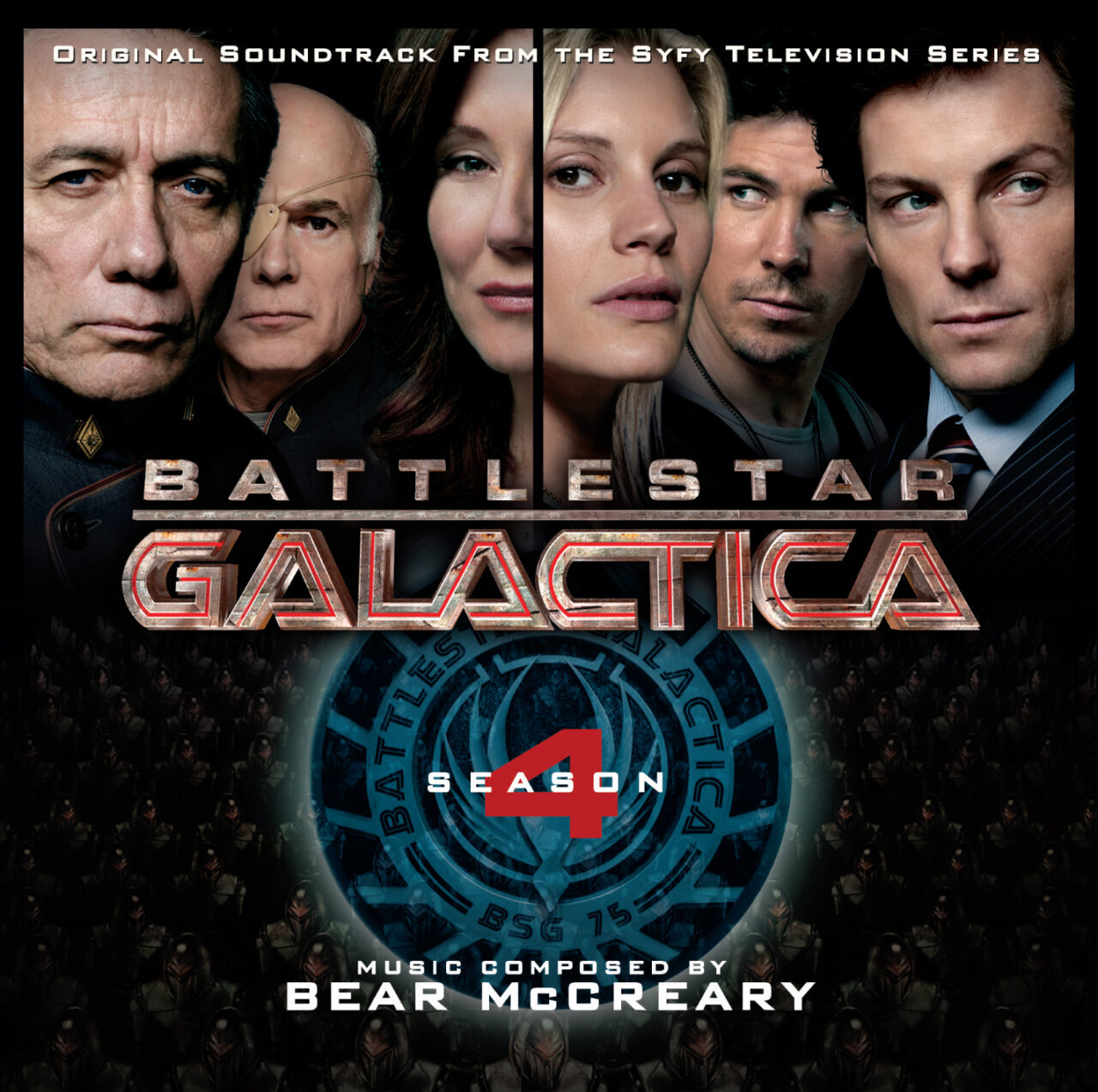
Battlestar Galactica: Season 4 – music by Bear McCreary
The fourth season of Battlestar Galactica is likely to be debated among fans for many years. It starts out with the unenviable task of reintroducing a character that the audience was led to believe was dead, barrels toward a mid-season climax that descends into dismal depths of despair, and then rockets down the homestretch toward the show’s still hotly-debated three-hour finale. It didn’t help that the season ended up taking the better part of a year to resolve the mid-season cliffhanger (thanks to the 2008 Writers’ Guild strike which shut down production for nearly every scripted series in North America for months); the season felt disjointed, and its (literally) darkest hours were hard to swallow.
The music, on the other hand, was never better. Having spent the show’s early years studiously avoiding the orchestral and synthetic cliches of most filmed science fiction, composer Bear McCreary had won over both the audience and his bosses, and was free to experiment, mix and match sonic elements, and do his part to create the show’s universe. McCreary shows every sign of being a major future composer – film music fans have spent so much of the past 35 years heaping praise on John Williams and Jerry Goldsmith as if they were the only composers working in Hollywood during that time, but I strongly feel that Bear McCreary’s name will be mentioned in the same reverent tones one or two decades from now. His music on Galactica remains one of the show’s most remembered and praised elements – even to the point of being parodied in an episode of South Park (to McCreary’s delight).
This time around, we’re treated to two CDs of music to show us why he’s earned that praise. The first CD covers the fourth season’s musical highlights, omitting the three-hour series finale. Key scenes and themes, and slightly less obvious (but very interesting) pieces, are arranged almost chronologically. The album kicks off with “Gaeta’s Lament”, which certainly didn’t happen early in the season, but it’s a great showcase of how much the music of Battlestar Galactica had evolved over the years. It features a great vocal performance from regular cast member Alessandro Juliani (who had, handily enough, studied opera in college), heard in a series of scenes leading up to the amputation of one of his critically-injured character’s legs. Starting out a cappella, the song gradually gains a backing ensemble of both orchestral and ethnic instruments, filling out nicely as the vocal grows more anguished. (The theme reappears in a different, completely instrumental form later, which helps one to appreciate just how serpentine the melody line is – if this makes any sense, I gained much appreciation of the vocal performance from listening to the instrumental.)
Tracks like “The Signal”, “Blood On The Scales” and “Boomer Takes Hera” get back to Battlestar business with the show’s signature wall of percussion, but even here the show’s musical palette expands, taking on choral elements and other unexpected surprises. Familiar character themes get a few new twists in tracks such as “Roslin And Adama Reunited”, “Grand Old Lady” and “Farewell Apollo”. Running throughout many of the first disc’s tracks, however, is a theme only introduced at the end of season three, the extended, Indian-flavored instrumental intro that led into that season’s surprising rendition of “All Along The Watchtower”. As that music was previously heard by several characters who were suddenly revealed to be “sleeper” Cylons, it recurs as a theme for the “final five”.
The biggest shock to the system of longtime Galactica soundtrack fans may be the pieces for solo piano heard on the first disc; “Elegy” and “Dreilide Thrace Sonata No. 1” are strictly piano. “Kara Remembers” starts out this way as well, though it eventually morphs into the full-blooded “final five” theme (revealed in the show’s mythology to be a piece of music composed by Starbuck’s father) complete with percussion and exotic instrumentation, stopping just short of leading into “Watchtower” as it did at the end of season three. Rounding off the first disc is “Diaspora Oratorio”, the jubilant choral piece that lulled everyone into a false sense of security for the aforementioned mid-season cliffhanger; while not chronologically sequenced, it’s a great finale and a good stopping point before the second CD.
The second disc may well be the crowning glory of the entire Battlestar music collection, containing the complete score for the three-hour finale Daybreak. From the unusual, off-format opening montage onward, there’s a wistful longing to the music. The very beginning of the first cue, “Caprica, Before The Fall”, offers one of the very few new themes introduced for Daybreak, a beautiful theme for humanity’s homeworld which recurs in the second half of both the story and the score as the fleet finds its way to a new home. Initially played with exotic ethnic instruments, as per Galactica house style, this theme becomes even more lovely and haunting when it’s echoed by a full orchestra, a nice little sonic hint of the civilization that will result from these events. As the story’s conclusion unfolds in an atypically relaxed pace and characters exit the main story, their themes reappear, often in new forms or grander interpretations than we’ve heard before. Perhaps the most heart-wrenching of these pieces is the track “So Much Life”, with “Starbuck Disappears” running a close second. Ironically, the Daybreak score has a slightly anticlimactic ending, simply because Bear McCreary’s music didn’t close out the series; to achieve the full effect, you’ll have to provide your own copy of Hendrix’s version of “All Along The Watchtower”. For action music from Daybreak, I’ll just point out a little track titled “Assault On The Colony” which lasts a solid 15 minutes. Now, not every second of it is wall-to-wall action music, but the hefty chunks of it that meet that description do not disappoint at all.
With the Caprica pilot soundtrack already released, the only Battlestar music left on the docket is a CD with the highlights of music from the two TV movies, Razori and The Plan, and while that’s something to look forward to, it’s hard to argue that the emotional arc of the music of Battlestar Galactica really comes to an end here – curiously enough, with wonderfully expansive orchestral music of the kind that had been eschewed early in the series’ run. Thanks to Bear McCreary’s unerring instincts in scoring for both traditional and unconventional instruments, the end result is a surprisingly diverse musical palette that refuses to be stuff into the background, relishes in its recognizable recurring themes and their  instant associations with the story and its characters, and is incredibly satisfying listening material even away from the images that inspired it. In a field crowded with exceptionally good soundtrack entries this year, Battlestar Galactica Season 4 may well be the best new film or TV music that’s going to hit anyone’s ears this year.
instant associations with the story and its characters, and is incredibly satisfying listening material even away from the images that inspired it. In a field crowded with exceptionally good soundtrack entries this year, Battlestar Galactica Season 4 may well be the best new film or TV music that’s going to hit anyone’s ears this year.
Disc one:
- Gaeta’s Lament (4:48)
- The Signal (5:08)
- Resurrection Hub (3:40)
- The Cult Of Baltar (5:41)
- Farewell Apollo (2:55)
- Roslin Escapes (2:55)
- Among The Ruins (7:44)
- Laura Runs (2:21)
- Cally Descends (3:08)
- Funeral Pyre (3:57)
- Roslin And Adama Reunited (1:59)
- Gaeta’s Lament (Instrumental) (4:50)
- Elegy (2:54)
- The Alliance (2:30)
- Blood On The Scales (5:20)
- Grand Old Lady (0:52)
- Kara Remembers (3:27)
- Boomer Takes Hera (2:40)
- Dreilide Thrace Sonata No. 1 (5:34)
- Diaspora Oratorio (4:51)
Disc two (Daybreak):
- Caprica City, Before The Fall (4:33)
- Laura’s Baptism (2:40)
- Adama In The Memorial Hallway (2:11)
- The Line (3:56)
- Assault On The Colony (15:07)
- Baltar’s Sermon (4:24)
- Kara’s Coordinates (4:21)
- Earth (3:07)
- Goodbye Sam (2:10)
- The Heart Of The Sun (3:20)
- Starbuck Disappears (2:08)
- So Much Life (5:00)
- An Easterly View (4:52)
- The Passage Of Time (1:15)
Released by: La-La Land Records
Release date: 2009
Disc one total running time: 77:14
Disc two total running time: 59:04
Torchwood: Children Of Earth – music by Ben Foster
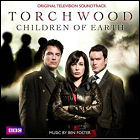 For the truncated (five episodes airing on consecutive nights in a single week) third season of Torchwood, the series delved into some very dark territory, and composer Ben Foster, already entrenched as the de facto maestro of Torchwood’s quirky earthbound adventures, seems to have relished the opportunity. The music of the five-episode Children Of Earth event has no problem going dark. Foster sets up several themes early on (including one for Ianto), while also building on some of the themes established in previous seasons (particularly the Captain Jack theme).
For the truncated (five episodes airing on consecutive nights in a single week) third season of Torchwood, the series delved into some very dark territory, and composer Ben Foster, already entrenched as the de facto maestro of Torchwood’s quirky earthbound adventures, seems to have relished the opportunity. The music of the five-episode Children Of Earth event has no problem going dark. Foster sets up several themes early on (including one for Ianto), while also building on some of the themes established in previous seasons (particularly the Captain Jack theme).
The early tracks seem like business as usual, but “We Are Coming” is a discordant, snarling wake-up call that accompanies one of the creepiest scenes in the entire five-hour cycle. It’s not a piece of music you need to be listening to in a dark room at two in the morning. The tension quickly ratchets up from there; the climax of the first episode leads into several tense action cues from the second episode, punctuated by the slightly-out-of-sequence cue “Gwen’s Baby”. A very brief “Ianto Jones” theme is established here as well, which is developed more fully later in “The Ballad Of Ianto Jones”.
Much of the soundtrack is taken up by the show’s musical action set pieces, with slower moments only occasionally getting the spotlight if they’re major scenes, including a lovely operatic theme that appears in the fourth and fifth episodes. For the most part, the music is sequenced in order of appearance, from the beginning of Day One to the end of Day Five, but there are a few out-of-sequence tracks (at least in the digital download edition of the album).
If I have one nit to pick with Children Of Earth from a musical standpoint, it’s actually a nit that I have to pick with the music of both Torchwood and Doctor Who: the reliance on the orchestra-playing-to-a-rock-beat sound has been stretched about as far as it can possibly go on either show. As the orchestrator for Murray Gold on Doctor Who, Ben Foster has a strong influence on both shows’ sounds, but whoever the architect of the “Who universe rock orchestra” sound is, they should know that the sound has reached its peak…and isn’t too far from reaching its nadir.
 Children Of Earth is a fine soundtrack, and damned unnerving in places. In rewatching the episodes, it becomes obvious how much of the story’s impact is down to the music, and quite a bit of the music stands alone nicely as well. If there’s any more story to tell with Torchwood (the ending of the season leaves the notion of picking up the story more than a little ambiguous), it’d be nice if both the storytelling and the music could stay at this level.
Children Of Earth is a fine soundtrack, and damned unnerving in places. In rewatching the episodes, it becomes obvious how much of the story’s impact is down to the music, and quite a bit of the music stands alone nicely as well. If there’s any more story to tell with Torchwood (the ending of the season leaves the notion of picking up the story more than a little ambiguous), it’d be nice if both the storytelling and the music could stay at this level.
- The First Sacrifice (1:25)
- What’s Occurring? (2:10)
- Jack’s Daughter (1:28)
- Diplomatic Cars (1:20)
- We Are Coming (1:12)
- Thames House (1:53)
- Double Crossed (1:26)
- Countdown To Destruction (1:52)
- The Crater (1:00)
- Torchwood Hunter (1:42)
- Gwen’s Baby (1:03)
- On The Run (1:13)
- Jack In A Box (1:34)
- Ianto Jones (0:50)
- Tractor Attack (2:21)
- Resurrection (1:11)
- Clement MacDonald (2:05)
- Something’s Coming (1:35)
- Eye Spy (1:20)
- Trust Nobody (1:46)
- The World Looks To The Skies (2:10)
- Jack’s Secret (1:36)
- Clem Remembers (1:34)
- Judgement Day (4:05)
- Requiem For The Fallen (1:23)
- The Ballad Of Ianto Jones (4:36)
- The Final Day (0:40)
- Calm Before The Storm (3:22)
- Phase Two Has Begun (1:50)
- Requisition 31 (2:38)
- He Was A Good Man (1:39)
- The Children Of Earth (3:27)
- Breaking The Connection (2:25)
- Fighting Back (2:02)
- Run For Your Lives (1:13)
- Sacrifice And Salvation (1:39)
- Redemption (3:13)
- I Can Run Forever (3:28)
- Here Comes Torchwood (2:24)
- Next Time On Torchwood (0:31)
Released by: Silva Screen
Release date: 2009
Total running time: 77:21
Note that the above tracklist reflects the digital download edition of the album, and the running order may be different for the CD.
Lost: Season 4 – music by Michael Giacchino
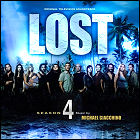 Thank goodness Lost found its way. After an occasionally painful-to-watch third season that filled us in on the backstory of the Others and the Dharma Initiative (not always the same entity, coincidentally), the decision was made by the show’s own producers and writers to shorten the three remaining seasons to something only slightly longer than a UK television season, setting a finite end point in the process. And yet somehow, with that limitation set, the show’s storytelling has become anything but finite, as it messes around with time and space with reckless abandon. The fourth season was an eye-opener that made good use of the renewed focus that was made necessary by the shorter season length; the fifth season then proceeded to be a jaw-dropper.
Thank goodness Lost found its way. After an occasionally painful-to-watch third season that filled us in on the backstory of the Others and the Dharma Initiative (not always the same entity, coincidentally), the decision was made by the show’s own producers and writers to shorten the three remaining seasons to something only slightly longer than a UK television season, setting a finite end point in the process. And yet somehow, with that limitation set, the show’s storytelling has become anything but finite, as it messes around with time and space with reckless abandon. The fourth season was an eye-opener that made good use of the renewed focus that was made necessary by the shorter season length; the fifth season then proceeded to be a jaw-dropper.
This CD of music from the fourth season of Lost also benefits from the show’s sharper focus, collecting the absolute cream of the musical crop from the fourth year. Many themes from prior seasons are rehashed and expanded upon, but for the most part, the fourth season’s soundtrack doesn’t feel like a musical flashback to something we’ve already heard. The early tracks seem to have a more intimate feel, a bit less epic, as the show’s core characters – ostensibly the only six survivors of the Oceanic 815 crash so far as the general public knows – work out their own internal dilemmas. Even these cues tend to take a right turn into melancholy or menace, as the fourth season’s early episodes developed a knack for revealing that the survivors’ apparently triumphant return wasn’t as it seemed.
 There are moments of uncharacteristic-for-Lost whimsy (“Maternity Hell”), deceptive calm (“The Constant”), and flat-out mayhem (“Keamy Away From Him”). Many of the tracks clock in at a pleasing length – actually, a few of them at surprising lengths for television scoring. The disc is chock full – and yet never quite achieves the slightly top-heavy feeling that I got from the two-disc season 3 soundtrack (even though it was marvelous to have the complete score from Through The Looking Glass in that collection). This is a good specimen of a compilation soundtrack with just the right cues, and at just the right length.
There are moments of uncharacteristic-for-Lost whimsy (“Maternity Hell”), deceptive calm (“The Constant”), and flat-out mayhem (“Keamy Away From Him”). Many of the tracks clock in at a pleasing length – actually, a few of them at surprising lengths for television scoring. The disc is chock full – and yet never quite achieves the slightly top-heavy feeling that I got from the two-disc season 3 soundtrack (even though it was marvelous to have the complete score from Through The Looking Glass in that collection). This is a good specimen of a compilation soundtrack with just the right cues, and at just the right length.
- Giving Up The Ghost (2:40)
- Locke’ing Horns (1:51)
- Lost Away – Or Is It? (1:41)
- Backgammon Gambit (1:17)
- Time And Time Again (2:43)
- The Constant (3:52)
- Maternity Hell (2:31)
- Karma Jin-itiative (1:24)
- Ji Yeon (3:07)
- Michael’s Right To Remain Wrong (1:55)
- Bodies And Bungalows (1:25)
- Benundrum (3:24)
- Hostile Negotiations (2:19)
- Locke-About (6:04)
- There’s No Place Like Home (2:35)
- Nadia On Your Life (1:41)
- C4-titude (1:59)
- Of Mice And Ben (2:19)
- Keamy Away From Him (4:58)
- Timecrunch (2:06)
- Can’t Kill Keamy (1:48)
- Bobbing For Freighters (5:20)
- Locke Of The Island (7:07)
- Lying For The Island (4:52)
- Landing Party (3:22)
- Hoffs-Drawlar (3:58)
Released by: Varese Sarabande
Release date: 2009
Total running time: 78:18
Leonard Nimoy – Mr. Spock’s Music From Outer Space
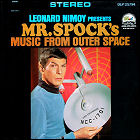 The first solo album released by actor Leonard Nimoy after the original Star Trek began riding a wave of publicity in the 1960s, Mr. Spock’s Music From Outer Space is a curious creation, consisting in roughly equal parts of Nimoy singing, Nimoy performing spoken word pieces in character as Mr. Spock, and instrumental renditions of songs related to two television shows with which he would become closely identified: Star Trek and Mission: Impossible. (The inclusion of a cover version of Lalo Schifrin’s Mission: Impossible theme might seem to be a bizarre happenstance – Nimoy didn’t become a regular on that show until after Star Trek had run its course in the summer of 1969, two years after this album was released – but the entire album project was bankrolled and guided by Dot Records and Desilu Studios executives. As unlikely as it is that Nimoy even got a recording contract, it was all a carefully coordinated move to exploit Nimoy’s high visibility as the “real star” of Star Trek.)
The first solo album released by actor Leonard Nimoy after the original Star Trek began riding a wave of publicity in the 1960s, Mr. Spock’s Music From Outer Space is a curious creation, consisting in roughly equal parts of Nimoy singing, Nimoy performing spoken word pieces in character as Mr. Spock, and instrumental renditions of songs related to two television shows with which he would become closely identified: Star Trek and Mission: Impossible. (The inclusion of a cover version of Lalo Schifrin’s Mission: Impossible theme might seem to be a bizarre happenstance – Nimoy didn’t become a regular on that show until after Star Trek had run its course in the summer of 1969, two years after this album was released – but the entire album project was bankrolled and guided by Dot Records and Desilu Studios executives. As unlikely as it is that Nimoy even got a recording contract, it was all a carefully coordinated move to exploit Nimoy’s high visibility as the “real star” of Star Trek.)
Musically speaking, if all of this sounds like an utterly surreal combination, trust me – it is. The Star Trek theme appears in two forms, a lounge-music-style rendition of the entire theme, and a piece called “Where No Man Has Gone Before”, which seems to be a variation/improvisation on the Enterprise fanfare which always served as the opening notes of the Trek theme. The Mission: Impossible theme tune, also a different arrangement from what was originally recorded for the television show, lacks some of the “official” rendition’s punch. Also appearing is “Beyond Antares”, a piece attributed to Star Trek writer Gene Coon and Wilbur Hatch, the man behind the theme tune from I Love Lucy who also happened to be the music director at Desilu Studios, the originators of Star Trek.
And then…there’s the actual “Spock music.” Nimoy performs spoken-word pieces in character as Spock on three numbers, “Alien”, “Twinkle Twinkle, Little Earth” and “A Visit To A Sad Planet”. “Twinkle Twinkle” is the lesser of this trio, being just plain silly, while “Sad Planet” is an interesting peek into the year and decade from which the album sprang; it takes the form of a short monologue, complete with stardate and log entry, in which Spock beams down to find a once-civilized planet reduced to radioactive rubble. He finds only one survivor, who poetically bemoans the fate of his world and then tells Spock that this sad planet is called Earth. It’s rather predictable, sure, but a fascinating (if you’ll pardon the pun) glimpse into the Cold War mindset through the lens of utterly disposable pop culture.
 How seriously can you possibly take Mr. Spock’s Music From Outer Space? All I’m going to say here is that you know you’re in trouble when you go from a Spock soliloquoy to Nimoy rumbling his way through “Where Is Love” from Oliver!. I have no doubt that these represent earnest, well-intentioned, heartfelt performances on Mr. Nimoy’s part, but the album also inadvertently serves as a reminder that pre-fabricated releases designed to cash in on the performer’s already-existing celebrity are nothing new. Once upon a time, it could even happen to Spock.
How seriously can you possibly take Mr. Spock’s Music From Outer Space? All I’m going to say here is that you know you’re in trouble when you go from a Spock soliloquoy to Nimoy rumbling his way through “Where Is Love” from Oliver!. I have no doubt that these represent earnest, well-intentioned, heartfelt performances on Mr. Nimoy’s part, but the album also inadvertently serves as a reminder that pre-fabricated releases designed to cash in on the performer’s already-existing celebrity are nothing new. Once upon a time, it could even happen to Spock.
- Theme From Star Trek (2:07)
- Alien (2:04)
- Where Is Love (2:03)
- Music to Watch Space Girls By (2:22)
- Beyond Antares (1:58)
- Twinkle, Twinkle Little Earth (2:21)
- Mission: Impossible (2:03)
- Lost In The Stars (2:32)
- Where No Man Has Gone Before (2:30)
- You Are Not Alone (2:07)
- A Visit To A Sad Planet (3:02)
Released by: Dot Records
Release date: 1967
Total running time: 25:09
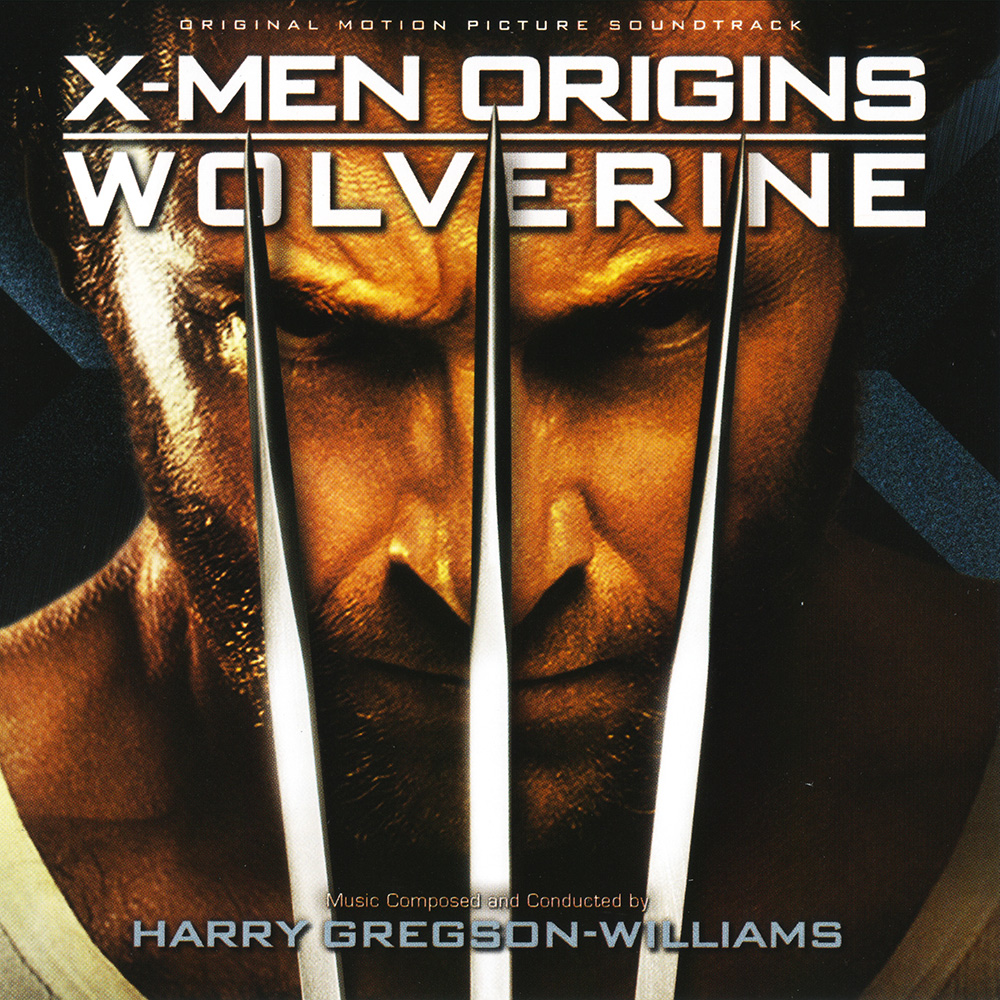
X-Men Origins: Wolverine – music by Harry Gregson-Williams
 While this fourth installment of the comic-inspired film franchise finally gives in to an unabashed celebration of the character (and, let’s face it, the actor who plays him) who has intrigued both long-time X-Men fans and uninitiated viewers for ten years, it’s an understatement to say that there’s been a little less cohesion behind the scenes. Each of the X-Men films has been handled by a different composer, with no one under any apparent obligation to build upon the themes established by his predecessors. The X-Men films have been scored by some top-flight talent as well, from John Ottman (Superman Returns) to no less than the late Michael Kamen.
While this fourth installment of the comic-inspired film franchise finally gives in to an unabashed celebration of the character (and, let’s face it, the actor who plays him) who has intrigued both long-time X-Men fans and uninitiated viewers for ten years, it’s an understatement to say that there’s been a little less cohesion behind the scenes. Each of the X-Men films has been handled by a different composer, with no one under any apparent obligation to build upon the themes established by his predecessors. The X-Men films have been scored by some top-flight talent as well, from John Ottman (Superman Returns) to no less than the late Michael Kamen.
It’s into that august company that rising star Harry Gregson-Williams (The Chronicles Of Narnia) steps with his score for X-Men Origins: Wolverine. His two scores for the Narnia movies thus far are worth mentioning, because the Wolverine score very strongly resembles those: many passages of Wolverine can be described, in a nutshell, as “Narnia, but darker.” Wolverine delves more into screeching string crescendos, electric guitar textures, and dark, pulsating electronics.
One of the strengths of Wolverine – the movie – is its obvious focus on one character. The score follows suit, but that turns out to be a musical weakness; much of the score CD has the same “feel” to it, with few major variations in the music to break the tension. Kayla gets a theme that strikes me as very Narnia, while an interesting motif creeps into the “Adamantium” cue (the scene in which we see the horrifying process Logan undergoes to become invincible), but then vanishes for the rest of the soundtrack. Would it really have killed anyone to, for example, roll out just a little hint of zydeco for Gambit’s scenes? That may sound silly, but we’re not talking about taking it to a ridiculous self-parodying degree that would take the viewer right out of the movie, but just enough of a flavoring to signify the character’s  presence. Instead, most of the scenes that don’t involve balls-to-the-wall, bold-and-brassy action music are kept to a menacing restrained thunder with few, if any, concessions to anything overtly thematic.
presence. Instead, most of the scenes that don’t involve balls-to-the-wall, bold-and-brassy action music are kept to a menacing restrained thunder with few, if any, concessions to anything overtly thematic.
It’s an enjoyable enough listen, and a fine specimen of modern orchestral-with-a-smattering-of-electronic movie music that serves its visual accompaniment well, but Wolverine won’t be replacing Harry Gregson-Williams’ Narnia work as the composer’s definitive calling card anytime soon.
- Logan Through Time (4:16)
- Special Privileges (1:58)
- Lagos, Nigeria (5:10)
- Wade Goes to Work (1:29)
- Kayla (2:50)
- Victor Visits (2:05)
- Adamantium (4:17)
- Agent Zero Comes for Logan (3:06)
- To The Island (3:43)
- Deadpool (4:09)
- The Towers Collapse (3:23)
- Memories Lost (2:57)
- “I’ll Find My Own Way” (1:24)
Released by: Varese Sarabande
Release date: 2009
Total running time: 45:23
Star Trek – music by Michael Giacchino
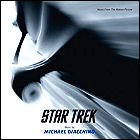 The moment that it was announced that J.J. Abrams would be taking the helm of the Enterprise for its next big-screen voyage, the first thought that entered my head wasn’t a question of loving or hating the movie over a year in advance; rather, it was “I hope Michael Giacchino is doing the music.” It actually would’ve been a massive surprise – bigger than any on-screen plot twist imaginable – if that hadn’t turned out to be the case: Giacchino’s music has accompanied Alias and Lost on TV, and Mission: Impossible III on film, all projects headed up by Abrams. Furthermore, with non-Abrams films like Speed Racer, Ratatouille and The Incredibles (whose music earned an Oscar nomination), Giacchino has proven himself to be at the forefront of a new generation of composers, and certainly a dependable one.
The moment that it was announced that J.J. Abrams would be taking the helm of the Enterprise for its next big-screen voyage, the first thought that entered my head wasn’t a question of loving or hating the movie over a year in advance; rather, it was “I hope Michael Giacchino is doing the music.” It actually would’ve been a massive surprise – bigger than any on-screen plot twist imaginable – if that hadn’t turned out to be the case: Giacchino’s music has accompanied Alias and Lost on TV, and Mission: Impossible III on film, all projects headed up by Abrams. Furthermore, with non-Abrams films like Speed Racer, Ratatouille and The Incredibles (whose music earned an Oscar nomination), Giacchino has proven himself to be at the forefront of a new generation of composers, and certainly a dependable one.
The question is: can he handle the final frontier? The Star Trek franchise has seen – and heard – some of the very best works of talents such as Jerry Goldsmith and James Horner, and some of the TV music hasn’t been bad either. Star Trek has established themes aplenty and a rich musical legacy – a lot for even an A-list composer take on. From the opening notes of his score album for the new Star Trek film, Giacchino makes it clear that he’s trying to forge his own path. The score does incorporate the immortal Alexander Courage theme, but not right at the beginning. A rather low-key, somber theme opens the movie, says its piece and gets off the stage very quickly. It’s not entirely unlike – but also not madly similar to – the unusual opening numbers of Star Trek VI and Star Trek Nemesis, and it certainly sets a different tone, shortly before doing the musical equivalent of crashing into something abruptly.
This theme recurs throughout the selections presented here, and though its first statement is somewhat downbeat, it’s driven through major keys and triumphant arrangements as well. “Nailin’ The Kelvin”, a cue accompanying a chaotic early scene in the film in which James T. Kirk is literally born in battle, features this theme in a bittersweet rendition, while “Enterprising Young Men” turns the motif into a bold anthem. A simple but menacing theme for Nero, the movie’s villain, surfaces in “Nero Sighted”, which also brings some of Giacchino’s trademark dissonant action music to the fore (one of the few places where I honestly listened to the soundtrack and thought, “Hey, that sounds a bit like Lost”). More Giacchino action music signatures can be found in “Run And Shoot Offense”, which also introduces a vaguely Eastern motif, and “Nero Death Experience”, which features a rare (for a Star Trek film score) choral interlude or two and resolves to a triumphant statement of the main theme before layering it into a boisterous action cue.
But there really aren’t many places where the Star Trek score is a dead ringer for Lost. Whether it’s a larger orchestral ensemble at Giacchino’s disposal, or a different approach to orchestration, the score is very, very traditional Hollywood blockbuster – at times, it reminds me more of John Williams than anything. Electronics seem to be kept under a tight rein, and the most exotic the selections on the album really get is a lonely ehru motif for Spock’s alien heritage. (Science fiction TV and film scores may be the ehru’s best friend in western music – see/hear also the new Battlestar Galactica and Earth: Final Conflict.)
And the original series theme as composed by Alexander Courage? Its opening fanfare makes a triumphant comeback in “To Boldly Go”, and the end credit suite then takes up a glorious full statement of the entire theme from start to finish, with a very pleasing arrangement that balances the French horns just right – sounding very much like Courage’s original orchestration, except with a full choir standing in for the soprano solo of the original theme. Over the considerable length of the end credit suite, Giacchino weaves Courage’s theme into his own material repeatedly, including one incredibly clever section where he demonstrates that the new movie’s theme can fit inside the original series theme as a running counterpoint composition, melding with the Courage theme and not straining against it. Gorgeous and very well thought-out.
 Some fans may be a little displeased that the entire score isn’t constantly calling back the themes of the original series and movies, but why should it? It’s clear from the outset that this is a different Star Trek, with fundamental changes made to select parts of the underlying premise. It’s still about James T. Kirk and Spock and the Enterprise and her gallant crew, but the movie spins these basic conceits into a different direction – and yet not not a drastically different one, just a way to open up new stories in a universe whose cat’s cradle of continuity had, by the time the last TV series ended, become almost too tangled for its own good. And if there is room for new Star Trek stories, then there’s room for new Star Trek music – and one gets the hint, during the end credits, that the next movie’s music might have a slightly more familiar feel to it. Judging by this album, hopefully Michael Giacchino will be giving the next movie its sound too. Star Trek probably isn’t what most Trek soundtrack fans are expecting – but maybe that’s not a bad thing.
Some fans may be a little displeased that the entire score isn’t constantly calling back the themes of the original series and movies, but why should it? It’s clear from the outset that this is a different Star Trek, with fundamental changes made to select parts of the underlying premise. It’s still about James T. Kirk and Spock and the Enterprise and her gallant crew, but the movie spins these basic conceits into a different direction – and yet not not a drastically different one, just a way to open up new stories in a universe whose cat’s cradle of continuity had, by the time the last TV series ended, become almost too tangled for its own good. And if there is room for new Star Trek stories, then there’s room for new Star Trek music – and one gets the hint, during the end credits, that the next movie’s music might have a slightly more familiar feel to it. Judging by this album, hopefully Michael Giacchino will be giving the next movie its sound too. Star Trek probably isn’t what most Trek soundtrack fans are expecting – but maybe that’s not a bad thing.
- Star Trek (1:03)
- Nailin’ The Kelvin (2:09)
- Labor Of Love (2:51)
- Hella Bar Talk (1:55)
- Enterprising Young Men (2:39)
- Nero Sighted (3:23)
- Nice To Meld You (3:13)
- Run And Shoot Offense (2:04)
- Does It Still McFly? (2:03)
- Nero Death Experience (5:38)
- Nero Fiddles, Narada Burns (2:34)
- Back From Black (:59)
- That New Car Smell (4:46)
- To Boldly Go (:26)
- End Credits (9:11)
Released by: Varese Sarabande
Release date: 2009
Total running time: 44:52
Reset Generation – music by 8-Bit Weapon
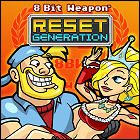 A collection of short, punchy instrumental pieces composed for Nokia’s Reset Generation game – which itself pays tribute to numerous games of yesteryear – 8-Bit Weapon’s soundtrack has a lot in common with the old video games that I like: the tunes are addictive, make me want to come back for more, and don’t hang around long enough to get old. Not a bad combination, really.
A collection of short, punchy instrumental pieces composed for Nokia’s Reset Generation game – which itself pays tribute to numerous games of yesteryear – 8-Bit Weapon’s soundtrack has a lot in common with the old video games that I like: the tunes are addictive, make me want to come back for more, and don’t hang around long enough to get old. Not a bad combination, really.
One thing that may throw listeners off, however, is the brevity I’m talking about above: many of the tracks barely clock in at over one minute, and many of them begin and end very abruptly. The latter is no accident: the tracks are meant to “loop” repeatedly during specific scenes and levels of Reset Generation itself. Fortunately, the tracks are timed out in such a way that one tune’s end leads directly into the next track almost seamlessly. Any one track by itself might seem to be an abrupt listening experience, but the entire soundtrack is a fun listen.
Highlights include “Power Up Pumpin'”, “Micro Anthem 2a03” (named after the NES’ sound chip), “64 Rocker”, “Rock Music Entry 6581” and the Leviathan mix of the Reset Generation theme – to name just a few. Those are just my favorites, but to an extent, all of the Reset Generation tracks are earworms that will prove difficult to dislodge from your head after you’ve heard them.
Included as a bonus track is “2D Died”, a riff on Don McLean’s “American Pie” (as in “the day 2D [gaming] died”) which does a great job of updating the original song into a chiptune extravaganza with vocoder-ized vocals. My one issue with “2D Died” is the same issue I have with “American Pie” itself (or, for that matter, “Sweet Home Alabama”: the first three minutes or so are okay, and after that I start looking at track time remaining because the same melody/chord structure is just repeating. I don’t know if that’s even  something to dock points for: 8-Bit Weapon is only paying homage to the 7+ minute original. And in any case, I like it better than Madonna’s update of the same song, but it’s just not something I feel compelled to listen to repeatedly, though its lyrics are pretty clever. But the rest of the album – which, by the way, can be downloaded free via the link below – is 8-Bit Weapon gold: repeat listening is compulsory (and with the loop-ready nature of the tracks, it’s even repeat-button-friendly!).
something to dock points for: 8-Bit Weapon is only paying homage to the 7+ minute original. And in any case, I like it better than Madonna’s update of the same song, but it’s just not something I feel compelled to listen to repeatedly, though its lyrics are pretty clever. But the rest of the album – which, by the way, can be downloaded free via the link below – is 8-Bit Weapon gold: repeat listening is compulsory (and with the loop-ready nature of the tracks, it’s even repeat-button-friendly!).
- Reset Generation Anthem (3:42)
- Aphex Tweek (1:26)
- Dungeon Derivative (0:54)
- Blip Bwop (1:16)
- Little Lost Lazer Boy (1:01)
- Lethargic Menace (1:16)
- Bubble Twin Bonanza (1:04)
- Where Fools Tread (1:01)
- Chiptune Chump (1:19)
- Commodore Base (1:20)
- Micro Anthem 2a03 (1:35)
- 64 Rocker (1:12)
- Krafty Noob (1:16)
- Tricky Game (1:04)
- Reset Generation Anthem – Leviathan Mix (1:22)
- Nin10do Raver (0:59)
- Breakin’ Bits (1:20)
- Macro Boogie (0:57)
- Power Up Pumpin’ (1:20)
- BootySoft Inc. (0:57)
- Corrupt Conscript Festival (1:25)
- SID Vicious (1:55)
- Rock Music Entry 6581 (1:04)
- Reset Generation Anthem – Sinister Mix (1:13)
- 2D Died (7:43)
Released by: 8-Bit Weapon / Nokia
Release date: 2008
Total running time: 39:41
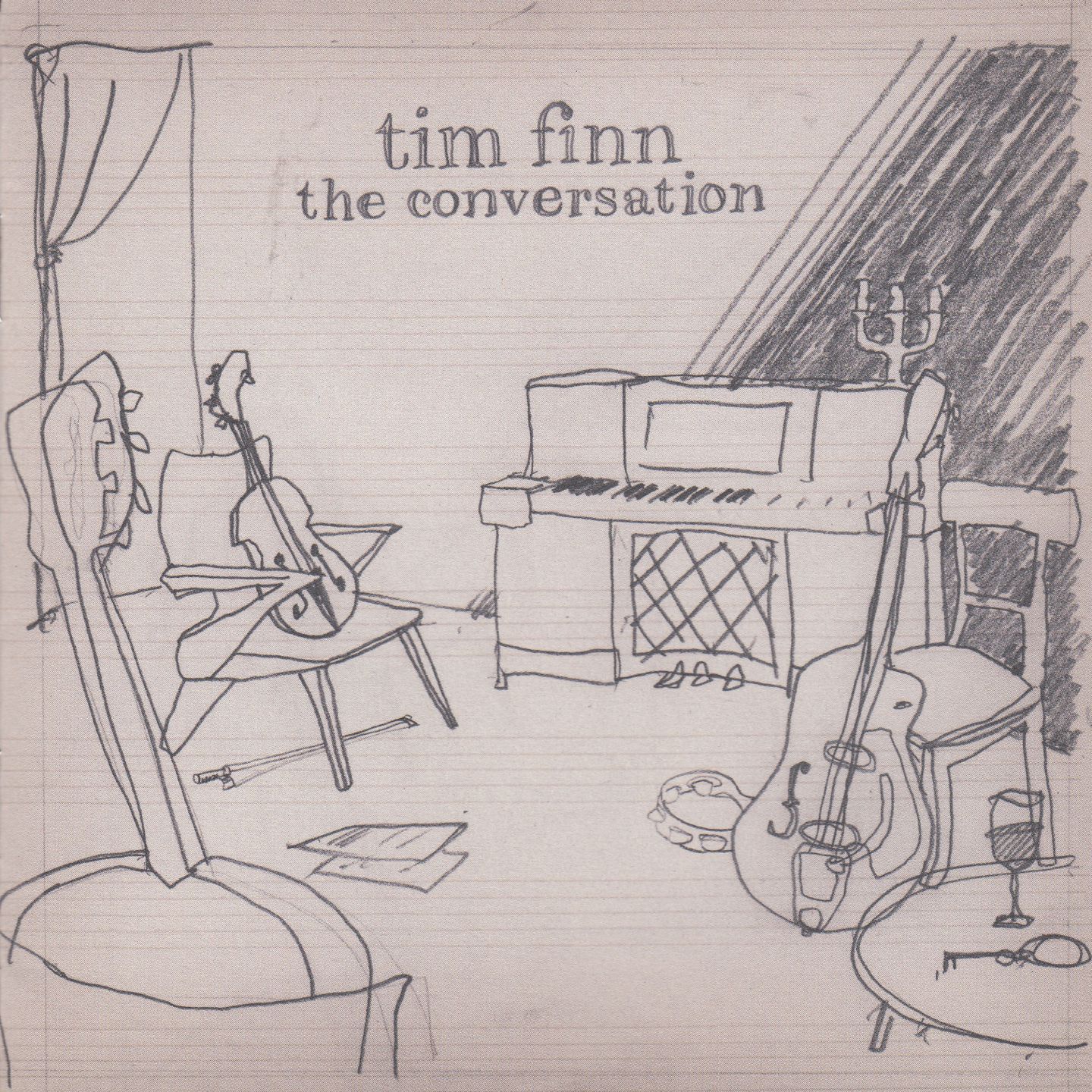
Tim Finn – The Conversation
 Some concept albums try to tell a specific story, while, with some concept albums, the “concept” is built around specific musical parameters – we’re only going to use these instruments, or we’re only going to play live with no overdubs. In the case of Tim Finn’s The Conversation, it’s the latter kind of concept album: reuniting with fellow Split Enz alumni Eddie Rayner on piano and Miles Golding on violin, Tim Finn aims for nothing less than a folk-rock version of chamber music.
Some concept albums try to tell a specific story, while, with some concept albums, the “concept” is built around specific musical parameters – we’re only going to use these instruments, or we’re only going to play live with no overdubs. In the case of Tim Finn’s The Conversation, it’s the latter kind of concept album: reuniting with fellow Split Enz alumni Eddie Rayner on piano and Miles Golding on violin, Tim Finn aims for nothing less than a folk-rock version of chamber music.
Now, this isn’t to say that it’s strictly lo-fi. Within that very specific combination of instruments, there are plenty of possibilities for a variety of sounds. The opening track, “Straw To Gold”, ends with a searing duet between violin and electric guitar. “Only A Dream” takes on a dreamy, almost-old-school bluegrass/country flavor with its guitar work. Out of the entire album, only “Forever Thursday” has drums at all. One guest musician brings a special touch to one particular song; “The Saw And The Tree”, which turns out to be an anti-domestic-violence song, features an actual saw solo that, against Golding’s violin work in the background, is positively haunting. The “limited range of instruments” turns out not to be much of a limit at all here.
The presence of Split Enz musicians doesn’t mean that this is a particularly Enz-y album, although it seems as though Finn’s Enz experiences inform the lyrics in many cases. Musically, the closest The Conversation gets to the Split Enz ethos is the light-hearted “Great Return”, and the Enz-iest element of that song is Rayner’s piano work. As Golding was dropped from the Enz lineup very early in the 1970s, when the band went from acoustic to electric, it’s hard to nail any of his performances down as particularly Enz in nature, and even so, there are almost 40 years of professional classical concert performance that stand a slightly better chance of being a musical influence on him. Lyrically, “Fall From Grace” references the Enz song “Maybe” and seems to be Finn’s equivalent of “All Those Years Ago”, while one wonders if “More Fool Me” isn’t a song whose words are pointed at a certain Mr. Judd.
 In the end, though, The Conversation is not only uniquely Tim Finn, but it’s fairly unique within Tim Finn’s body of work; I’d be very surprised to hear him do another album in this style, but The Conversation – despite its sparse arrangements – is substantial enough that it’s a very worthwhile detour from Finn’s usual fare.
In the end, though, The Conversation is not only uniquely Tim Finn, but it’s fairly unique within Tim Finn’s body of work; I’d be very surprised to hear him do another album in this style, but The Conversation – despite its sparse arrangements – is substantial enough that it’s a very worthwhile detour from Finn’s usual fare.
- Straw To Gold (3:57)
- Out Of This World (3:01)
- The Saw & The Tree (4:04)
- Slow Mystery (4:00)
- Rearview Mirror (3:43)
- Only A Dream (2:31)
- Fall From Grace (2:42)
- Invisible (3:51)
- Snowbound (2:57)
- Great Return (3:02)
- Imaginary Kingdom (3:17)
- Forever Thursday (2:57)
- More Fool Me (3:41)
Released by: Capitol
Release date: 2008
Total running time: 43:43


